Craftsman 13517243 User Manual SCROLLING SABRE SAW Manuals And Guides L0704225
CRAFTSMAN Saw Sabre Manual L0704225 CRAFTSMAN Saw Sabre Owner's Manual, CRAFTSMAN Saw Sabre installation guides
User Manual: Craftsman 13517243 13517243 CRAFTSMAN SCROLLING SABRE SAW - Manuals and Guides View the owners manual for your CRAFTSMAN SCROLLING SABRE SAW #13517243. Home:Tool Parts:Craftsman Parts:Craftsman SCROLLING SABRE SAW Manual
Open the PDF directly: View PDF ![]() .
.
Page Count: 32

Owner's Manual
SCROLLING SABRE SAW
Model No. 135.17243 __
Caution:
Before using this product,
read this manual and follow
all its Safety Rules and
Operating Instructions.
Safety
Operation
Maintenance
Parts
EspaSol, R 18
Sears, Roebuck and Co., Hoffman Estates, IL 60179

Page
Warranty ..................................................... 2
Power Tool Safety Rules ...................................... 3-5
Symbols ..................................................... 6
Functional Description and Specifications ........................... 7
Assembly .................................................... 8
Operating Instructions ........................................ 8-11
Tool Tips ................................................. 11-14
Maintenance ................................................. 15
Service Parts .............................................. 16-17
EspaSol .................................................. 18-32
FULL ONE YEAR WARRANTY ON CRAFTSMAN
SCROLLING SABRE SAW
If this CRAFTSMAN Scrolling Sabre Saw fails to give complete satisfaction
within one year from the date of purchase, RETURN IT TO THE
NEAREST SEARS STORE IN THE UNITED STATES, and Sears will
replace it, free of charge.
If this CRAFTSMAN Scrolling Sabre Saw is used for commercial or rental
purposes, this warranty applies for only 90 days from the date of purchase.
This warranty gives you specific legal rights, and you may also have other
rights which vary from slate to state.
Sears, Roebuck and Co., Dept. 817WA, Hoffman Estates, IL 60179
-2-

Read and understand all instructions. Failure to follow all instructions
listed below, may result in electric shock, fire and/or serious personal injury.
SAVE THESE INSTRUCTIONS
Work Area
Keep your work area clean and well lit.
Cluttered benches and dark areas invite
accidents.
Do not operate power tools in explosive
atmospheres, such as in the presence of
flammable liquids, gases, or dust. Power
tools create sparks which may ignite the dust
orfumes.
Keep by-standers, children, and visitors
away while operating apower tool.
Distractions can cause you to lose control.
Electrical Safety
Double Insulated tools are equipped with a
polarized plug (one blade is wider than the
other.) This plug will fit in a polarized outlet
only one way. If the plug does not fit fully
in the outlet, reverse the plug. If it still does
not fit, contact a qualified electrician to
install a polarized outlet. Do not change
the plug in any way. Double Insulation []
eliminates the need for the three wire
grounded power cord and grounded power
supply system. Before plugging in the tool, be
certain the outlet voltage supplied is within the
voltage marked on the nameplate. Do not use
'_4C only" rated tools with a DC power supply,
Avoid body contact with grounded
surfaces such as pipes, radiators, ranges
and refrigerators. There is an increased risk
of electric shock if your body is grounded. If
operating the power too! in damp locations is
unavoidable, a Ground Fault Circuit Interrupter
must be used to supply the power to your tool.
Electrician's rubber gloves and footwear will
further enhance your personal safety.
Don't expose power tools to rain or wet
conditions. Water entering a power tool will
increase the risk of electric shock.
Do not abuse the cord. Never use the cord
to carry the tools or pull the plug from an
outlet. Keep cord away from heat, oil, sharp
edges or moving parts. Replace damaged
cords immediately. Damaged cords increase
the risk of electric shock.
When operating a power tool outside, use
an outdoor extension cord marked "W-A"
or "W." These cords are rated for outdoor use
and reduce the risk of electric shock. Refer to
"Recommended sizes of Extension Cords" in
the Accessory section of this manual.
Personal Safety
Stay alert, watch what you are doing and
use common sense when operating a
power tool. Do not use tool while tired or
under the influence of drugs, alcohol, or
medication. A moment of inattention while
operating power tools may result in serious
personal injury.
Dress properly. Do not wear loose clothing
or jewelry. Contain long hair. Keep your
hair, clothing, and gloves away from
moving parts. Loose clothes, jewelry, or long
hair can be caught in moving parts. Keep
handles dry, clean and free from oil and
grease.
Avoid accidental starting. Be sure switch
is "OFF" before plugging in. Carrying tools
with your finger on the switch or plugging in
tools that have the switch "ON" invites
accidents.
Remove adjusting keys or wrenches before
turning the tool "ON". A wrench or a key
that is left attached to a rotating part of the tool
may result in personal injury,
Do not overreach. Keep proper footing and
balance at all times. Proper footing and
balance enables better control of the tool in
unexpected situations.
Use safety equipment, Always wear eye
protection. Dust mask, non-skid safety
shoes, hard hat, or hearing protection must be
used for appropriate conditions.
Tool Use and Care
Use clamps or other practical way to
secure and support the workpiece to a
stable platform. Holding the work by hand or
against your body is unstable and may lead to
loss of control.
-3-

Do not force tool. Use the correct tool for
your application. The correct tool will do the
job better and safer at the rate for which it is
designed.
Do not use tool if switch does not turn it
"ON" or "OFF". Any tool that cannot be
controlled with the switch is dangerous and
must be repaired.
Disconnect the plug from the power
source before making any adjustments,
changing accessories, or storing the tool.
Such preventive safety measures reduce the
risk of starting the tool accidentally.
Store idle tools out of reach of children
and other untrained persons, Tools are
dangerous in the hands of untrained users.
Maintain tools with care. Keep cutting
tools sharp and clean. Properly maintained
tools, with sharp cutting edges are less likely
to bind and are easier to control. Any
alteration or modification is a misuse and
may result in a dangerous condition.
Check for misalignment or binding of
moving parts, breakage of parts, and any
other condition that may affect the tools
operation. If damaged, have the tool
serviced before using. Many accidents are
caused by poorly maintained tools. Develop
a periodic maintenance schedule for your
tool,
Use only accessories that are
recommended by the manufacturer for
your model. Accessories that may be
suitable for one tool, may become hazardous
when used on another tool.
Service
Tool service must be performed only by
qualified repair personnel. Service or
maintenance performed by unqualified
personnel could result in a risk of injury. For
example: internal wires may be misplaced or
pinched, safety guard return springs may be
improperly mounted.
When servicing a tool, use only identical
replacement parts, Follow instructions in
the Maintenance section of this manual.
Use of unauthorized parts or failure to follow
Maintenance Instructions may create a risk
of electric shock or injury. Certain cleaning
agents such as gasoline, carbon
tetrachloride, ammonia, etc. may damage
plastic parts.
Hold tool by insulated gripping surfaces
when performing an operation where the
cutting tool may contact hidden wiring or
its own cord. Contact with a "live" wire will
make exposed metal parts of the tool "live"
and shock the operator. Do not drill, fasten
or break into existing walls or other blind
areas where electrical wiring may exist. If
this situation is unavoidable, disconnect all
fuses or circuit breakers feeding this
worksite.
Never leave the trigger locked "ON".
Before plugging the tool in, check that the
trigger lock is "OFF". Accidental start-ups
could cause injury.
Be aware of the location and setting of
the switch "Lock-ON" button. If the switch
is locked "ON" during the use, be ready for
emergency situations to switch it "OFF", by
first pulling the trigger then immediately
releasing it without pressing the "Lock-ON"
button,
Keep hands away from cutting area. Do
not reach under the material being cut.
The proximity of the blade to your hand is
hidden from your sight.
Keep hands from between the gear
housing and saw blade holder, The
reciprocating blade holder can pinch your
fingers.
Do not use dull or damaged blades. Bent
blade can break easily or cause kickback.
Before starting to cut, turn tool "ON" and
allow the blade to come to full speed.
Tool can chatter or vibrate if blade speed is
too slow at beginning of cut and possibly
kickback.
-4-

Always wear safety goggles or eye
protection when using this tool. Use a
dust mask or respirator for applications
which generate dust.
Secure material before cutting. Never
hold it in your hand or across legs. Small
or thin material may flex or vibrate with the
blade, causing loss of control.
Make certain all adjusting screws and the
blade holder are tight before making a
cut, Loose adjusting screws and holders
can cause the tool or blade to slip and lose of
control may result.
When removing the blade from the tool
avoid contact with skin and use proper
protective gloves when grasping the
blade or accessory. Accessories may be
hot after prolonged use.
Use only accessories that are sold by
Sears for your model. Accessories that may
be suitable for one tool may become
hazardous when used on another tool.
_Some dust created by
power sanding, sawing,
grinding, drilling, and other construction
activities contains chemicals known to
cause cancer, birth defects or other
reproductive harm. Some examples of
these chemicals are:
• Lead from lead-based paints,
• Crystalline silica from bricks and cement
and other masonry products, and
• Arsenic and chromium from chemically-
treated lumber.
Your risk from these exposures varies,
depending on how often you do this type of
work. To reduce your exposure to these
chemicals: work in a well ventilated area, and
work with approved safety equipment, such
as those dust masks that are specially
designed to filter out microscopic particles.
-5-

Symbols
IMPORTANT: Some of the following symbols may be used on your tool. Please study them
and learn their meaning. Proper interpretation of these symbols will allow you to operate the
tool better and safer.
Symbol Name
V Volts
A Amperes
Hz Hertz
W Watt
kg Kilograms
rain Minutes
s Seconds
_l Diameter
% No load speed
Designation/Explanation
Voltage (potential)
Current
Frequency (cycles per second)
Power
Weight
Time
Time
Size of drill bits, grinding wheels, etc.
Rotational speed, at no load
.../min
0
1,2,3 ....
I, It, III,
-.€,
I
[]
@
&
@
Revolutions or reciprocation per minute
Off position
Selector settings
Infinitely variable selector with off
Arrow
Alternating current
Direct current
Alternating or direct current
Class II construction
Earthing terminal
Warning symbol
Ni-Cad RBRC seal
Revolutions, strokes, surface speed,
orbits etc. per minute
Zero speed, zero torque...
Speed, torque or position settings.
Higher number means greater speed
Speed is increasing from 0 setting
Action in the direction of arrow
Type or a characteristic of current
Type or a characteristic of current
Type or a characteristic of current
Designates Double Insulated
Construction tools.
Grounding terminal
Alerts user to warning messages
Designates Ni-Cad battery recycling
program
This symbol designates
lhat this tool is listed by
Underwriters Laboratories.
!_ This symbol designates
that this tool is listed by
the Canadian Standards
Association.
0®This symbol designates
that this tool is listed to
Canadian Slandards by
Underwriters Laboratories.
This symbol designates that
this tool is listed by
Underwriters Laboratories,
and listed to Canadian
Standards by Underwriters
Laboratories.
This symbol
designates
that
this tool
complies
to NOM
Mexican
Standards.
-6-

F_i_I Disconnect the plug from the power source before making any
assembly, adjustments or changing accessories. Such preventive safety
measures reduce the risk of starting the tool accidentally,
Scrolling Sabre Saw with Laser-Trac TM
SCROLLING KNOB
ILASER LIGHT/WORKLIGHT
CONTROL WHEEL
"LOCK-ON"
/_f--_-. BUTTON
LASER LIGHT
ADJUSTMENT
SCREW /
RUBBERIZED
GRIP
VARIABLE SPEED
CONTROLLED
TRIGGER SWITCH
iVENTILATION
OPENINGS
WORKLIGHT
TOOL-LESS
BLADE
CHANGE
COVER
FOOT
DUST
BLOWER
SWITCH
ORBIT/SCROLLING
CONTROL LEVER
DUST PORT
/BLADE
STORAGE
COMPARTMENT
MAXIMUM CAPACITIES
Model Blade Blade Stroke
No, Thickness Action Length Wood Aluminum Steel
17243 N1inmlum.7m111-Maximum 1.7ram Orbital/Scroll 13/16" 3-!/8" 1/2" 1/4"
NOTE:Fortool specifications refer to the nameplateon your tool.
-7=

+a_ i6!9X0<427 9-G4 9/23/04 9 ;04 _i,__ P 8
Attaching the Blade
To prevent personal injury,
always disconnect plug from
power source before assembling parts, making
adjustments, or changing blades.
1, Insert the saw blade (teeth in cutting
direction) until it latches in the plunger
(Fig. 2).
TOOL-LESS
COVER
When inserting the saw blade, the back of
the blade must rest in the groove of the
guide roller (Fig, 3).
2. To remove blade, lift tool-less blade change
cover up with index finger and thumb and
remove blade.
For use with both T or U shank sabre saw
blades.
BLADE---+
GU DE ROLLER --
f ...........................
VARIABLE SPEED CONTROLLED
TRIGGER SWITCH
Your tool is equipped with a variable speed trigger
switch, The tool can be turned 'rON" or "OFF" by
squeezing or releasing the trigger. The speed
can be adjusted from the minimum to maximum
nameplate SPM by the pressure you apply to the
trigger. Apply more pressure to increase the
speed and release pressure to decrease speed
(Fig. 1).
"LOCK-ON" BUTTON
The "Lock-ON" button, located in the handle of
your tool allows Ior continuous operation at
maximum SPM without holding the trigger
(Fig. 1).
TO LOCK TRIGGER "ON": squeeze trigger,
depress button and release trigger.
TO UNLOCK THE TRIGGER: squeeze trigger
and release it without depressing the "Lock-
ON" button.
lf the "Lock-ON" button is
continuously being depressed,
the trigger can not be released.
PLUNGER SPEED
The stroke rate may be adjusted as described
earlier under "Variable Speed Controlled
Trigger Switch". The best results for a particular
application are determined by experience,
though as a general rule, slower speeds are for
denser materials and faster speeds are for soft
materials.
LASER LIGHT/WORKLIGHT
CONTROL WHEEL
_ASER RADIATION, AVOID
DIRECT EYE EXPOSURE.
DO NOT stare into the laser light source.
Never aim light at another person or object
other than the workpiece. Laser light can
damage your eyes.
DO NOT use tinted glasses
to enhance the laser light,
Tinted glasses will reduce overall vision for
the application and interfere with the normal
operation of the tool.
_ Never aim the beam at a
workpiece with a reflective
surface. Bright shiny reflective sheet steel or
similar reflective surfaces are not
recommended for laser use. Reflective
surfaces could direct the beam back toward
the operator,
Use of controls or
adjustments or performance
of procedures other than those specified
herein may result in hazardous radiation
exposure.
The use of optical
instruments with this product
will increase eye hazards.
-8-
÷
÷

SM !6i9X00427 9-04 9/23/04 9:04 AM P_ 9
The 4 position control wheel allows you to
control the function of the lights. Below, lists
the function of each setting (Fig. 1).
Setting 1: Turns OFF all lights.
Setting 2: Turns ON only the laser light.
Setting 3: Turns ON both the laser light and
the worklight.
Setting 4: Turns ON only the worklight
The laser line guide is a class Ilia laser with a
maximum output power of 5.0m Watts and
conforms to 21 CFR 1040.10 and 1040.11.
LASER-TRAC TM LASER LINE GUIDE
The Laser-Trac line guide help you to follow
your cutting line with greater ease and
precision when making a cut.
TO ADJUST THE LASER LINE GUIDE
Use aflat head screwdriver to turn the
adjustment screw located on the side of the
laser module (Fig. 4). Turn on the laser line
guide by rotating the control wheel to setting
number 2. Rotate the adjustment screw until
the laser line is in the center of the blade.
There is no need to turn the tool "ON" while
adjusting the light beam.
The laser line guide has a limited amount of
travel. Do not continue to turn the adjustment
screw after the line stops moving or if it
becomes significantly harder to turn the screw.
Overturning the adjustment screw may cause
the adjustment system to break or cause the
adjustment screw to fall out of the tool.
USING THE LASER LINE GUIDE
Onty turn on the laser light on when the tool is
on the workpiece.
1. First mark the line of cut on your workpiece
(good side down.)
2. Insert plug into the power source.
3. Place the front edge of the saw foot on the
workpiece, turn the 4 position control wheel to
setting 2 for laser light only or setting 3 for
laser light and WORKLIGHT and align beam
with the line of cut.
4. Hold the tool firmly, squeeze the trigger and
allow the tool to reach desired speed.
5. Press down (to keep the saw foot flat
against the work surface) as you slowly push
the saw forward, keeping the beam in line with
the line of cut.
6. After completion of the cut, release the
trigger and turn off the laser light.
I/
•AVOID EXPOSURE- LASER
RADIATION IS EMITTEO FROM
THIS APERTURE. I
,,EVITELAEXPOSICII_N. DESDE I
ESTAABERTU.RASEEMITE
RADIACIOHLASER. I
BLADE STORAGE COMPARTMENT
Your sabre saw is equipped with a blade
storage compartment in the dust port of your
saw (Fig. 5). To remove, pull compartment
out of dust port in direction of arrow,
Always make sure the bIade storage
compartment is securely in the dust port to
prevent blades from falling out.
i"[i_1
DUST
PORT
BLADE
COMPARTMENT
-9-
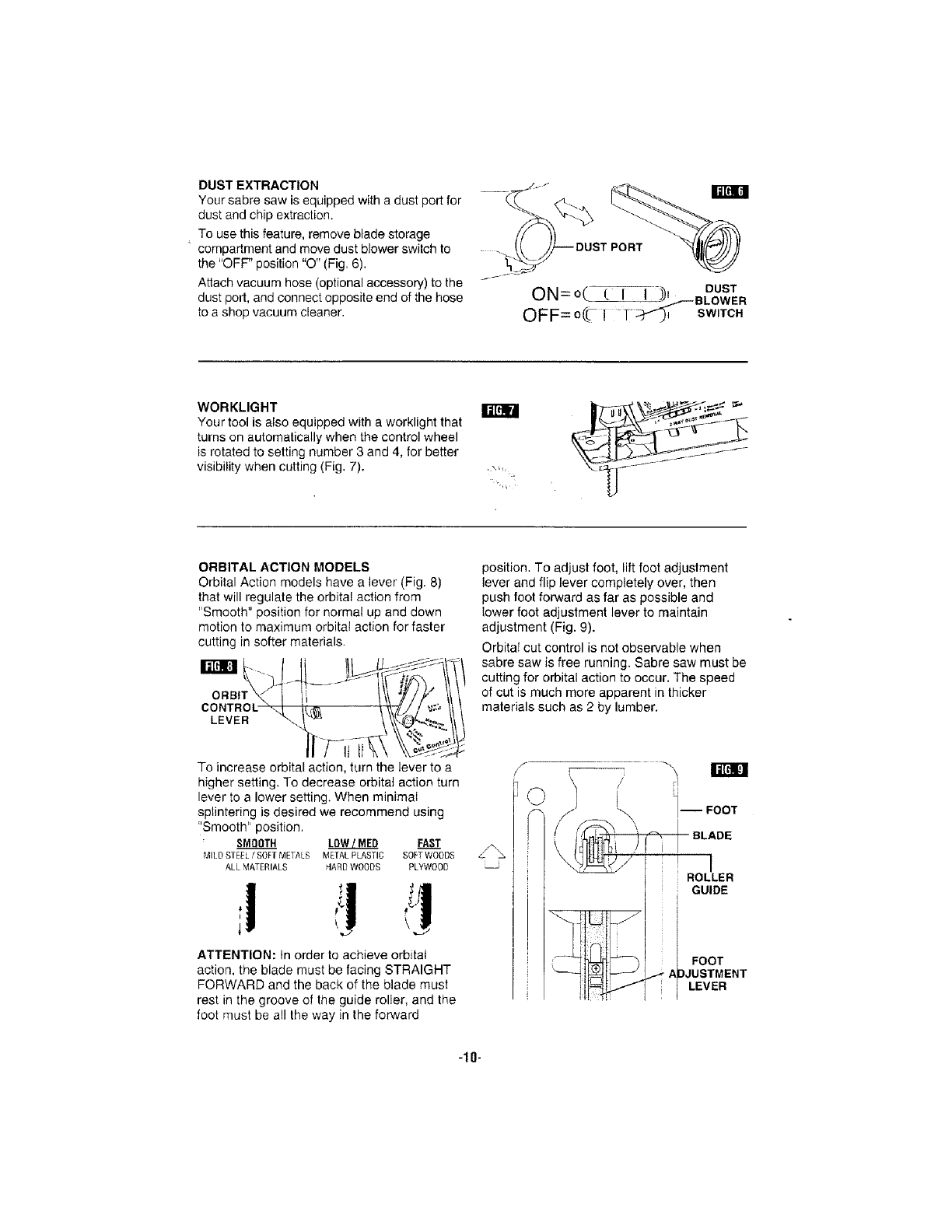
DUST EXTRACTION
Your sabre saw is equipped with a dust port for
dust and chip extraction,
To use this feature, remove blade storage
compartment and move dust blower switch to
the "OFF" position "O" (Fig, 6).
Attach vacuum hose (optional accessory) to the
dust port, and connect opposite end of the hose
to a shop vacuum cleaner.
ON=o( ( I 1 3)1 DUST
,-.--"-BLOWER
OFF=o(C ! 1:_" SWITCH
WORKLIGHT
Your tool is also equipped with a worklight that
turns on automatically when the control wheel
is rotated to setting number 3 and 4, for better
visibility when cutting (Fig. 7).
I_[dlM
ORBITAL ACTION MODELS
Orbital Action models have a lever (Fig. 8)
that will regulate the orbital action from
"Smooth" position for normal up and down
motion to maximum orbital action for faster
cutting in softer materials.
To increase orbital action, turn the lever to a
higher setting. To decrease orbital action turn
lever to a lower setting. When minimal
splintering is desired we recommend using
"Smooth" position.
SMOOTH LOW!MED FAST
MILD STEEL/SOFT METALS METAL PLASTIC SOFTWOODS
ALL MATERIALS "lARD WOODS PLYWOOD
ATTENTION: In order to achieve orbital
action, the blade must be facing STRAIGHT
FORWARD and the back of the blade must
rest in the groove of the guide roller, and the
foot must be all the way in the forward
position. To adjust foot, lift foot adjustment
lever and flip lever completely over, then
push foot forward as far as possible and
lower foot adjustment lever to maintain
adjustment (Fig. 9).
OrbitaI cut control is not observable when
sabre saw is free running. Sabre saw must be
cutting for orbital action to occur. The speed
of cut is much more apparent in thicker
materials such as 2 by lumber.
I
ROLLER
GUIDE
FOOT
tpJUSTMENT
LEVER
-10-
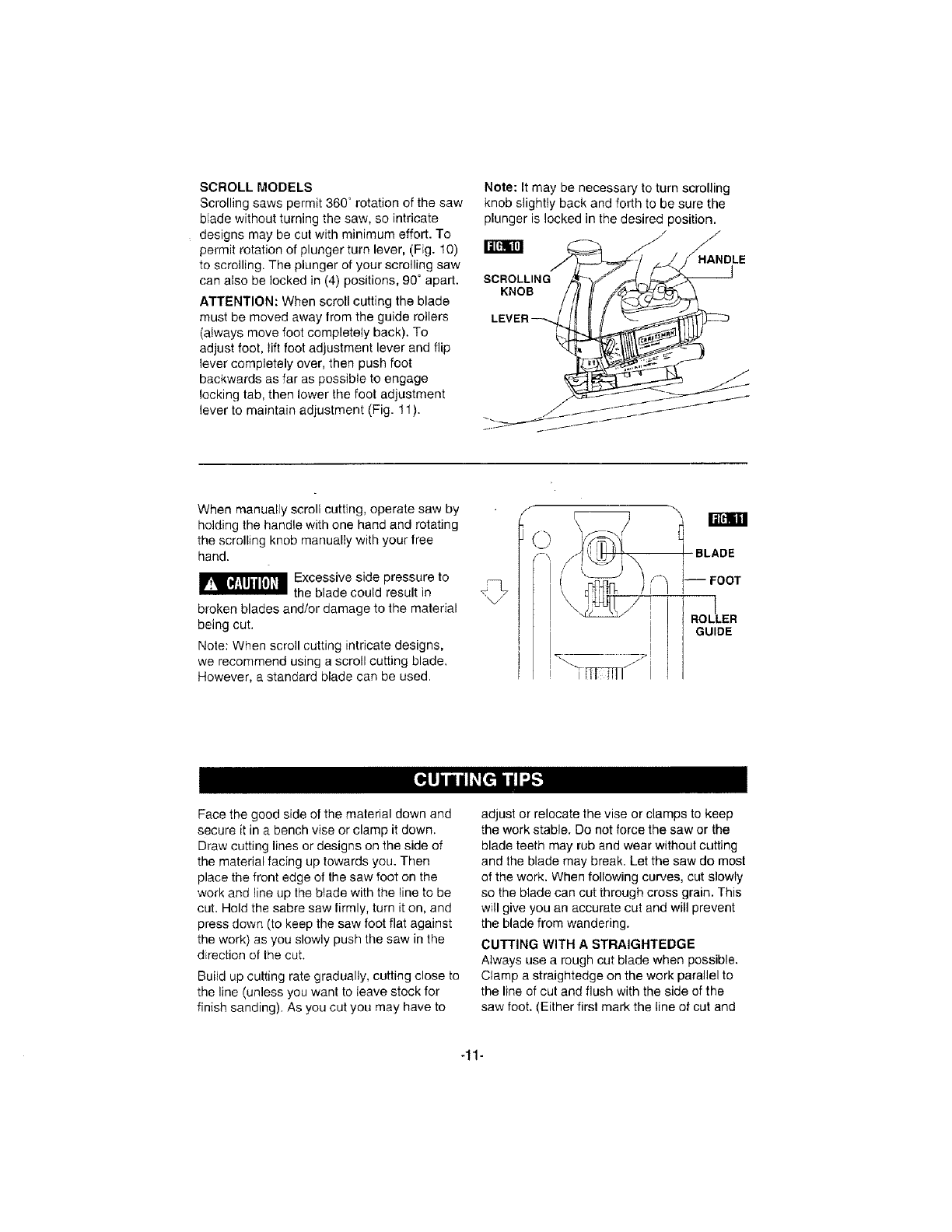
SCROLL MODELS
Scrolling saws permit 360 ° rotation of the saw
blade without turning the saw, so intricate
designs may be cut with minimum effort. To
permit rotation of plunger turn lever, (Fig. 10)
to scrolling. The plunger of your scrolling saw
can also be locked in (4) positions, 90" apart.
ATTENTION: When scroll cutting the blade
must be moved away from the guide rollers
(aIways move foot completely back). To
adjust foot, lift foot adjustment lever and flip
lever completely over, then push foot
backwards as far as possible to engage
locking tab, then lower the foot adjustment
lever to maintain ac ustment (Fig. 11).
Note: It may be necessary to turn scrolling
knob slightly back and forth to be sure the
plunger is locked in the desired position.
J
SCROLLING
KNOB
When manually scroll cutting, operate saw by
holding the handle with one hand and rotating
the scrolling knob manually with your free
hand.
_ xcessive side pressure to
the blade could result in
broken blades and/or damage to the material
being cut.
Note: When scroll cutting intricate designs,
we recort/mend using a scroll cutting blade.
However, a standard blade can be used.
I_[liH
©
\
I'JC
I
ROLLER
GUIDE
Face the good side of the material down and
secure it in a bench vise or clamp it down.
Draw cutting lines or designs on the side of
the material facing up towards you. Then
place the front edge of the saw foot on the
work and line up the blade with the line to be
cut. Hold the sabre saw firmly, turn it on, and
press down (to keep the saw foot flat against
the work) as you slowly push the saw in the
direction of the cut.
Build up cutting rate gradually, cutting close to
the line (unless you want to leave stock for
finish sanding). As you cut you may have to
adjust or relocate the vise or clamps to keep
the work stable. Do not force the saw or the
blade teeth may rub and wear without cutting
and the blade may break. Let the saw do most
of the work. When following curves, cut slowly
so the blade can cut through cross grain. This
will give you an accurate cut and will prevent
the blade from wandering.
CUTTING WITH A STRAIGHTEDGE
Always use a rough cut blade when possible,
Clamp a straightedge on the work parallel to
the line of cut and flush with the side of the
saw foot, (Either first mark the line of cut and
-11-
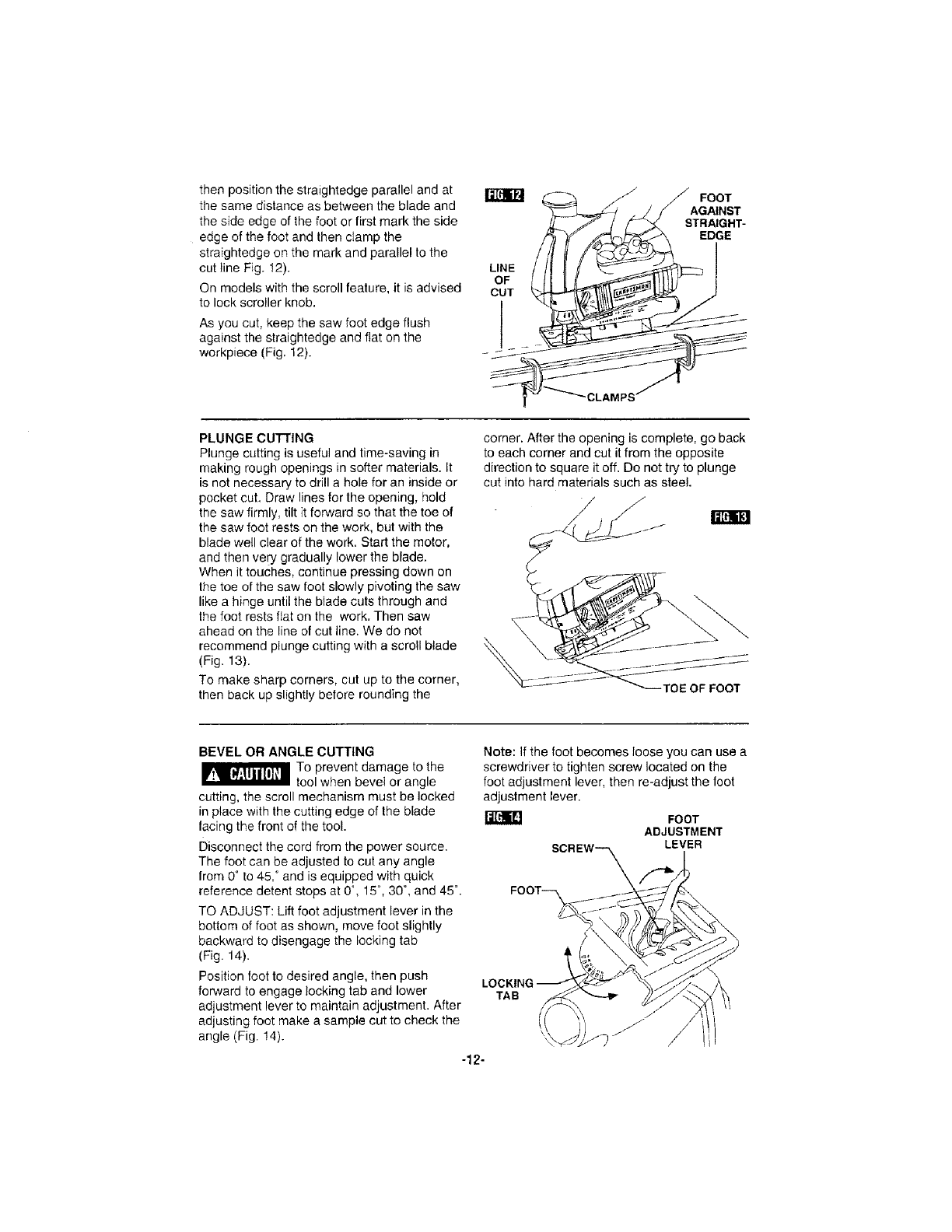
then position the straightedge parallel and at
the same distance as between the blade and
the side edge of the foot or first mark the side
edge of the foot and then clamp the
straightedge on the mark and parallel to the
cut line Fig. 12).
On models with the scroll feature, it is advised
to lock scroller knob.
As you cut, keep the saw foot edge flush
against the straightedge and fiat on the
workpiece (Fig. 12).
PLUNGE CUTTING
Plunge cutting is useful and time-saving in
making rough openings in softer materials. It
is not necessary to drill a hole for an inside or
pocket cut. Draw lines for the opening, hold
the saw firmly, tilt it forward so that the toe of
the saw foot rests on the work, but with the
blade well clear of the work. Start the motor,
and then very gradually lower the blade.
When it touches, continue pressing down on
the toe of the saw foot slowly pivoting the saw
like a hinge until the blade cuts through and
the foot rests flat on the work. Then saw
ahead on the line of cut line. We do not
recommend plunge cutting with a scroll blade
(Fig. 13).
To make sharp corners, cut up to the corner,
then back up slightly before rounding the
corner. After the opening is complete, go back
to each corner and cut it from the opposite
direction to square it off. Do not try to plunge
cut into hard materials such as steel.
J
BEVEL OR ANGLE CUTTING
To prevent damage to the
tool when bevel or angle
cutting, the scroll mechanism must be locked
in place with the cutting edge of the blade
facing the front of the tool.
Disconnect the cord from the power source.
The foot can be adjusted to cut any angle
lrom 0 ° to 45," and is equipped with quick
reference detent stops at 0 °, 15 °, 30 °, and 45 °.
TO ADJUST: Lift foot adjustment lever in the
bottom of foot as shown, move foot slightly
backward to disengage the locking tab
(Fig. 14).
Position foot to desired angle, then push
forward to engage locking tab and lower
adjustment lever to maintain adjustment. After
adjusting foot make a sample cut to check the
angle (Fig. 14).
-12-
Note: If the foot becomes loose you can use a
screwdriver to tighten screw located on the
foot adjustment lever, then re-adjust the loot
adjustment lever.
FOOT
ADJUSTMENT
SCREW-_ LEVER
TAB
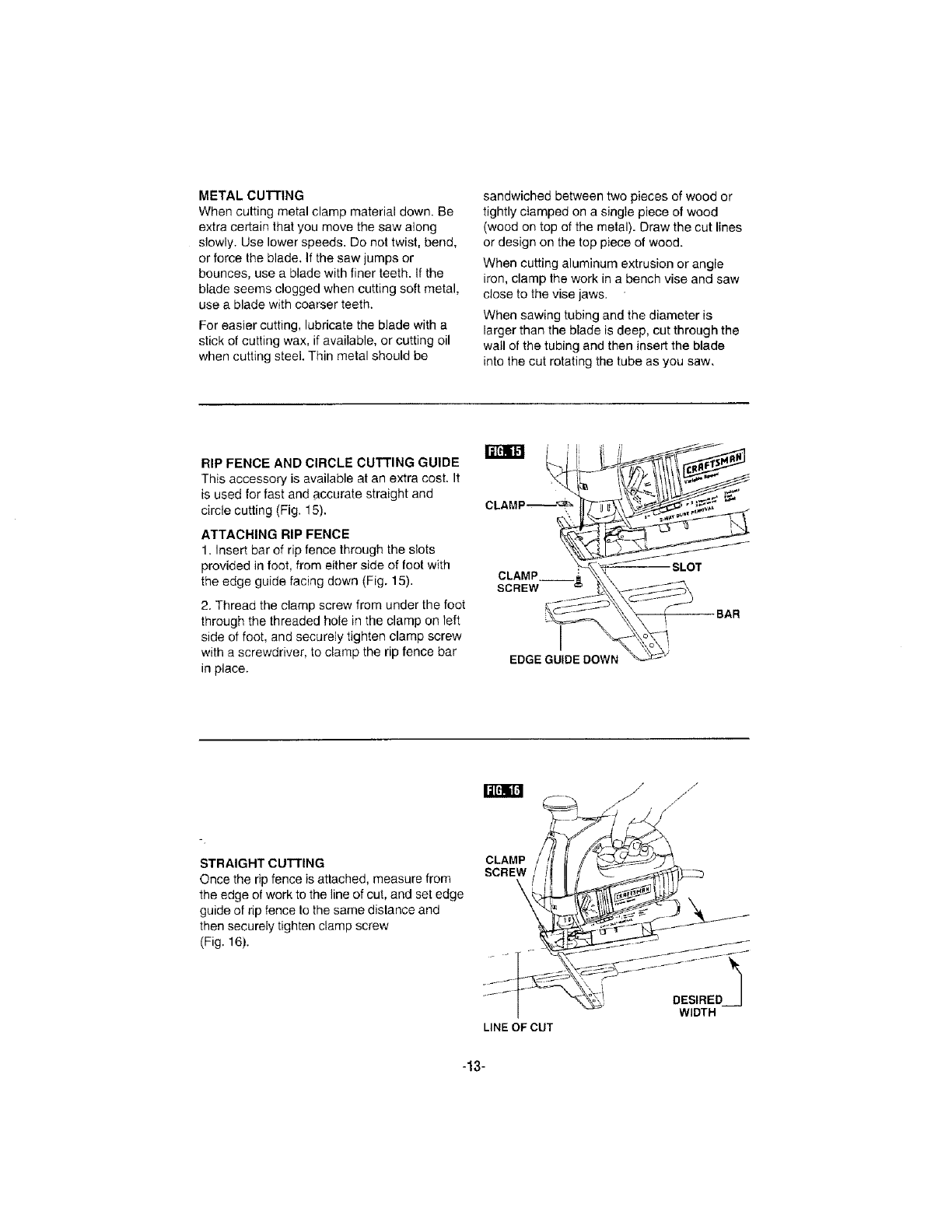
METAL CUTTING
When cutting metal clamp material down. Be
extra certain that you move the saw along
slowly. Use lower speeds. Do not twist, bend,
or force the blade. If the saw jumps or
bounces, use a blade with finer teeth, if the
blade seems clogged when cutting soft metal,
use a blade with coarser teeth.
For easier cutting, lubricate the blade with a
stick of cutting wax, if available, or cutting oil
when cutting steel. Thin metal should be
sandwiched between two pieces of wood or
tightly clamped on a single piece of wood
(wood on top of the metal). Draw the cut lines
or design on the top piece of wood.
When cutting aluminum extrusion or angle
iron, clamp the work in a bench vise and saw
close to the vise jaws.
When sawing tubing and the diameter is
larger than the blade is deep, cut through the
wail of the tubing and then insert the blade
into the cut rotating the tube as you saw.
RIP FENCE AND CIRCLE CUTTING GUIDE
This accessory is available at an extra cost. It
is used for fast and accurate straight and
circle cutting (Fig. 15).
ATTACHING RIP FENCE
1. Insert bar of rip fence through the slots
provided in foot, from either side of loot with
the edge guide facing down (Fig. 15).
CLAMp..--.---._
CLAMP _
SCREW
2. Thread the clamp screw from under the foot
through the threaded hole in the clamp on left I
side of foot, and securely tighten clamp screw I
with a screwdriver, to clamp the rip fence bar I
EDGE GUIDE DOWN
in place,
SLOT
STRAIGHT CUTTING CLAMP ,
SCREW /
Once the rip fence is attached, measure from , _
the edge of work to the line of cut, and set edge
guide of rip fence to the same distance and
then securely tighten clamp screw
(Fig. 16).
LINE OF CUT
DESIRED___
WIDTH
-13-
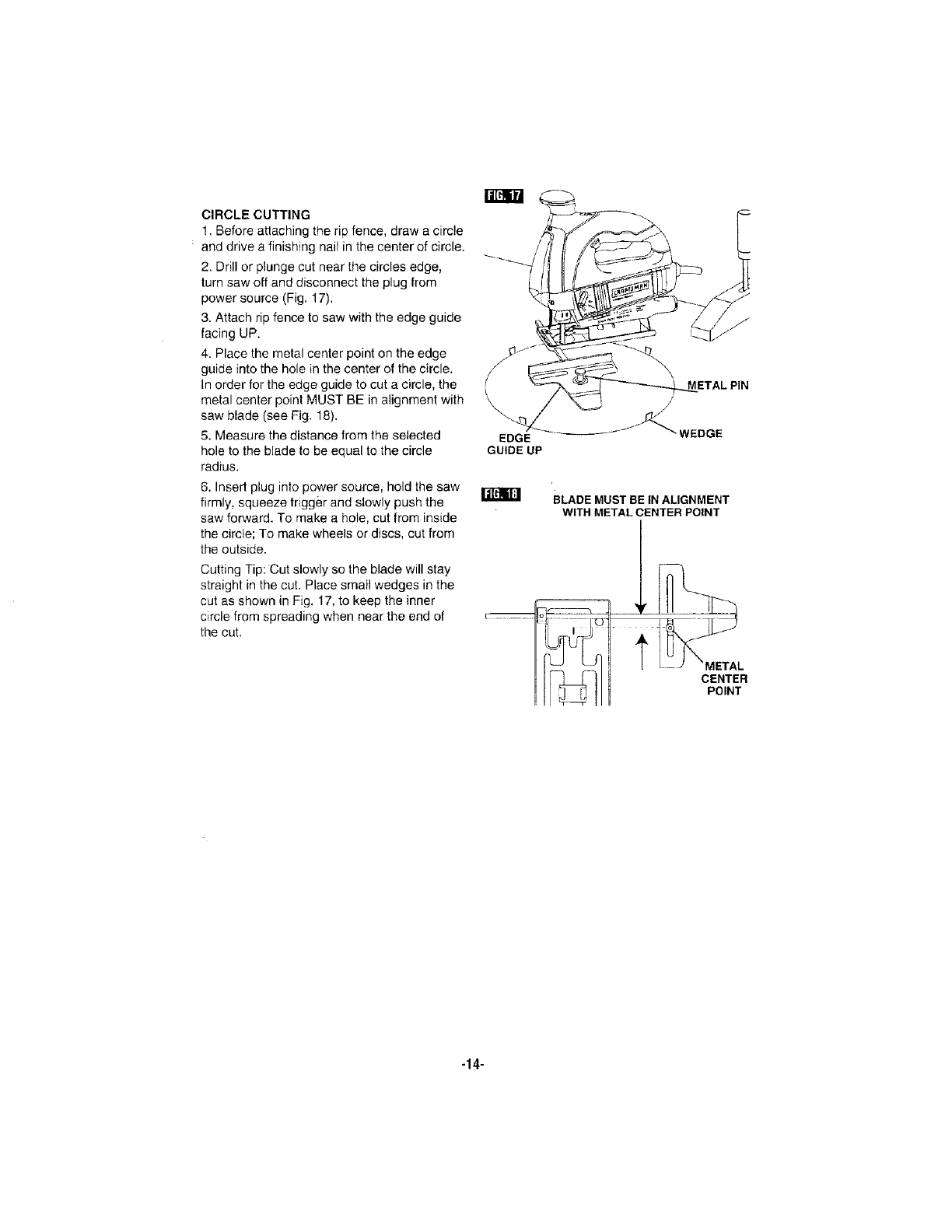
CIRCLE CUTTING
1. Before attaching the rip fence, draw a circle
and drive a finishing nail in the center of circle.
2. Drill or plunge cut near the circles edge,
turn saw off and disconnect the plug from
power source (Fig. 17).
3. Attach rip fence to saw with the edge guide
facing UP.
4. Place the metal center point on the edge
guide into the hole in the center of the circle.
In order for the edge guide to cut a circle, the
metal center point MUST BE in alignment with
saw blade (see Fig. 18).
5. Measure the distance from the selected
hole to the bIade to be equal to the circle
radius.
6. Insert plug into power source, hold the saw
firmly, squeeze trigger and slowly push the
saw forward. To make a hole, cut from inside
the circle; To make wheels or discs, cut from
the outside.
Cutting Tip: Cut slowly so the blade will stay
straight in the cut. Place small wedges in the
cut as shown in Fig. 17, to keep the inner
circle from spreading when near the end of
the cut.
(
\ J
EDGE "WEDGE
GUIDE UP
BLADE MUST BE IN ALIGNMENT
WITH METAL CENTER POINT
-14-
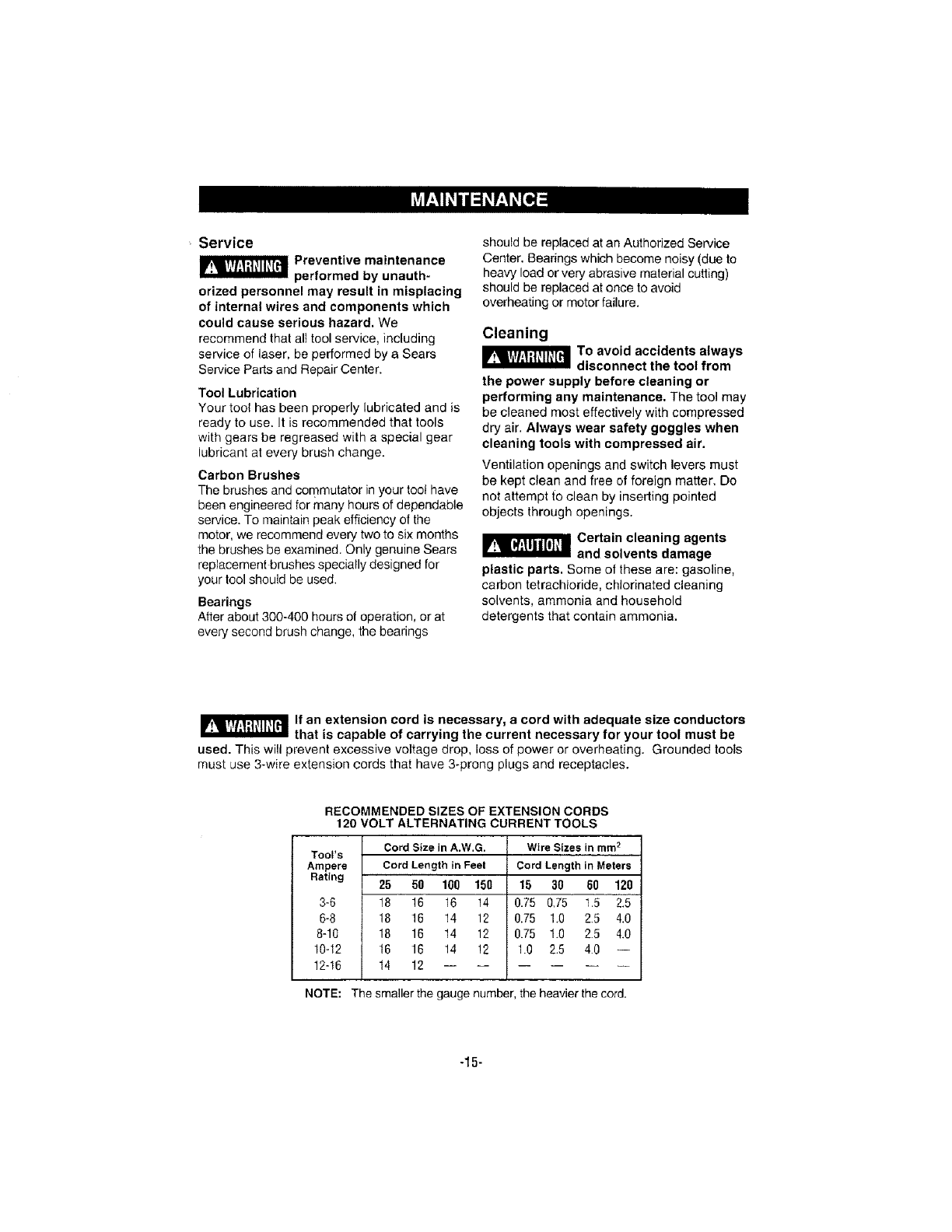
Service
_reventive maintenance
performed by unauth-
orized personnel may result in misplacing
of internal wires and components which
could cause serious hazard. We
recommend that all tool service, including
service of laser, be performed by a Sears
Service Parts and Repair Center.
Tool Lubrication
Your tool has been properly lubricated and is
ready to use. It is recommended that tools
with gears be regreased with a special gear
lubricant at every brush change.
Carbon Brushes
The brushes and commutator in your toot have
been engineered for many hours of dependable
service. To maintain peak efficiency of the
motor, we recommend every two to six months
the brushes be examined. Only genuine Sears
replacement brushes specially designed for
your tool shouid be used.
Bearings
After about 300-400 hours of operation, or at
every second brush change, the bearings
should be replaced at an Authorized Service
Center. Bearings which become noisy (due to
heavy load or very abrasive material cutting)
should be replaced at once to avoid
overheating or motor failure.
Cleaning
I__1 To avoid accidents always
disconnect the tool from
the power supply before cleaning or
performing any maintenance. The tool may
be cleaned most effectively with compressed
dry air. Always wear safety goggles when
cleaning tools with compressed air.
Ventilation openings and switch levers must
be kept clean and free of foreign matter. Do
not attempt to clean by inserting pointed
objects through openings.
_ertain cleaning agents
and solvents damage
plastic parts. Some of these are: gasoline,
carbon tetrachloride, chlorinated cleaning
solvents, ammonia and household
detergents that contain ammonia.
_lf an extension cord is necessary, a cord with adequate size conductors
that is capable of carrying the current necessary for your tool must be
used. This will prevent excessive voltage drop, loss of power or overheating. Grounded tools
must use 3-wire extension cords that have 3-prong plugs and receptacles.
RECOMMENDED SIZES OF EXTENSION CORDS
120 VOLT ALTERNATING CURRENT TOOLS
Tool's
Ampere
Rating
3-6
68
8-10
10-12
12-16
Cord Size in A.W.G.
Cord Length in Feel
25 50 100 150
18 16 16 14
18 16 14 12
18 16 14 12
16 16 14 !2
14 12
Wire Sizes in mm2
Cord Length in Meters
15 30 60 120
0.75 0,75 1.5 2.5
0.75 1,0 2.5 4.0
0.75 1.0 2.5 4.0
1.0 2.5 40 --
NOTE: The smaller the gauge number, the heavier the cord.
-15-
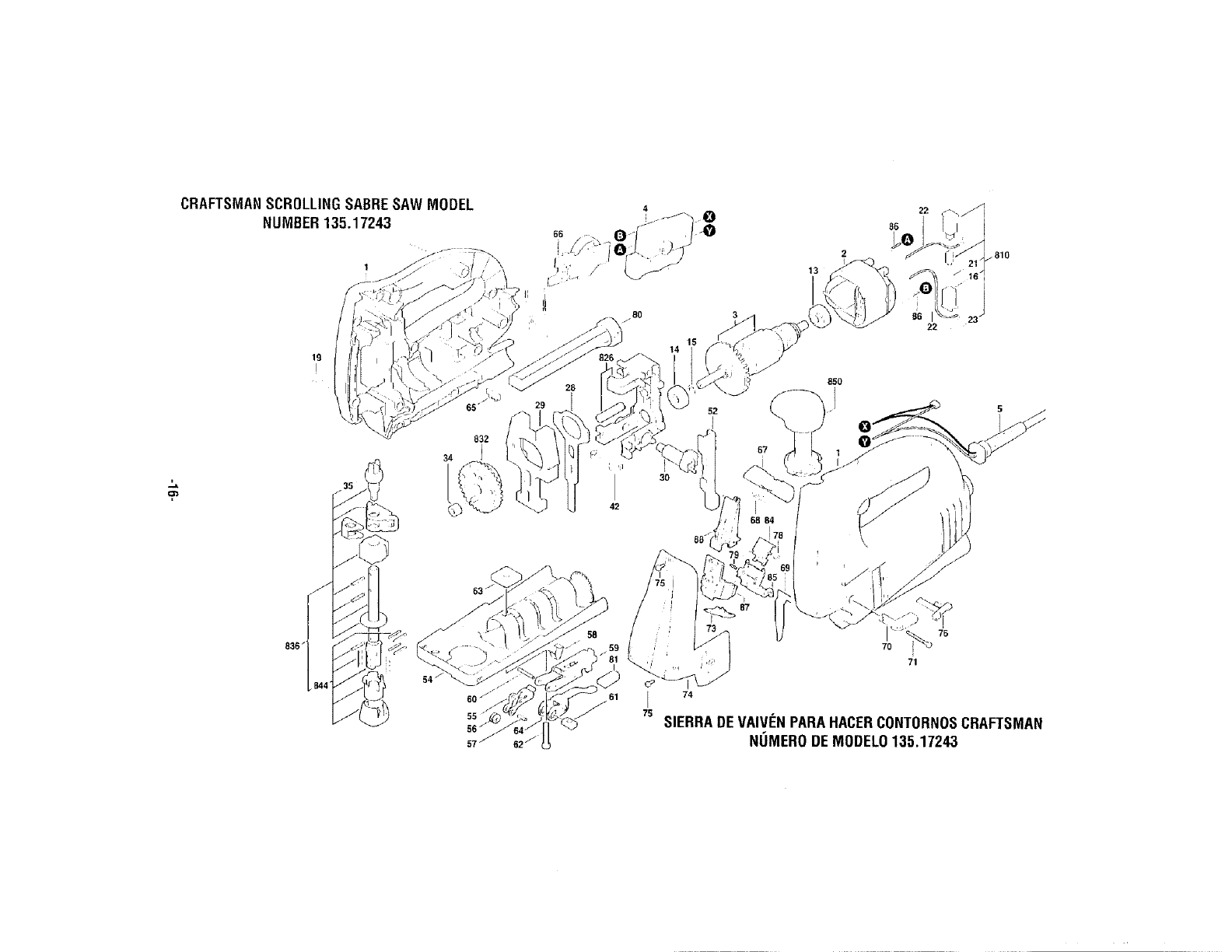
CRAFTSMANSCROLLINGSABRESAWMODEL
NUMBER135.17243
/
19
I
t
,= 35
34
65"
832
14
28
29
2
13
850
.810
42
61
67
30
70
71
75
74
SIERRADE VAIVE:NPARA HACERCONTORNOSCRAFTSMAN
NUMERODE MODELO135.17243

KEY PART
NO. NO.
1 2610916229
2 2610913978
3 2610913979
4 2610924106
5 2610916910
13 2610967219
14 2610917489
15 2610018632
16 2610320548
19 2914201705
21 2610329898
22 2610968496
23 2610329896
28 2610914014
29 2610913999
30 2610914016
34 2610914010
35 2610914007
42 2610914011
52 2610914015
54 2610916883
55 2610914018
56 2610914884
57 2610913996
58 2610914020
59 2610914019
60 2610914022
61 2610913993
62 2610913994
PART NAME
Housing
Field
Armature
Switch
Cord
Bushing
Ball Bearing
Retaining Ring
Brush Holder
Screw
Spring
Cable
Terminal Clip
Pusher
Counterweight
Shaft
Bushing
Bushing
Spring Clip
Arm
Foot
Bracket
Roller
Pin
Spring Clip
Holder
Pin
Yoke
Bolt
1
1
I
1
1
1
1
1
2
12
2
2
2
1
t
t
1
1
1
1
1
1
1
1
2
1
1
1
1
KEY
NO.
63
64
65
66
67
68
69
70
71
73
74
75
76
78
79
8O
81
84
85
86
87
88
810
826
832
836
844
85O
PART
NO.
2610913995
2610913992
2610917358
2610924134
2610916536
2610390329
2610912487
2610916094
2914201672
261O922316
2610924140
2914201664
261O916537
2610018199
2918150120
2610916541
2610917102
2610922519
2610922520
2610923594
2610924145
2610924146
2610917266
2610917218
261O917219
2610917220
2610917221
2610917222
261O924135
PART NAME
Nut
Lever
Locking Tang
Board Assembly
Lock Botton
Spring
Guard
Lever
Screw
Lens
Metal Front End
Screw
Lever
Spring
Set Screw
Blade Storage
Cap
Sled
Sled Holder
Cable Assembly
Cover
Insulation
Brush Set
Bearing Plate Assembly
Gear Assembly
Plunger Assembly
Blade Holder Assembly
Knob Assembly
Owner's Manual (not shown)
1
1
1
1
1
1
1
1
1
1
1
3
1
1
1
1
1
1
1
1
1
1
1
1
1
1
1
1
1
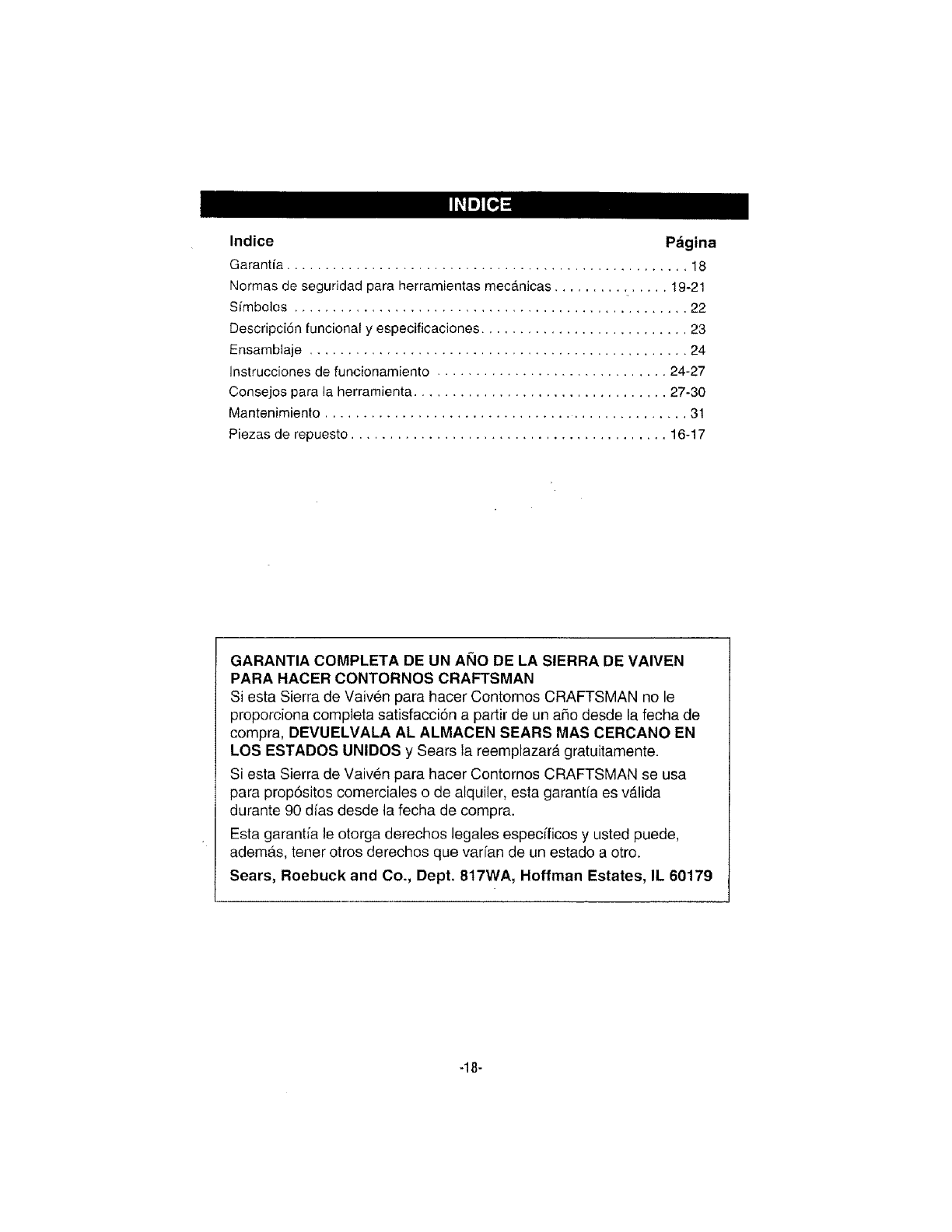
Indice Pdgina
Garantia .................................................... 18
Normas de seguridad para herramientas mec_.nicas ............... 19-21
Simbolos ................................................... 22
Descripci6n funcional y especificaciones ........................... 23
Ensamblaje ................................................. 24
Instrucciones de funcionamiento .............................. 24-27
Consejos para la herramienta ................................. 27-30
Mantenimiento ............................................... 31
Piezas de repuesto ......................................... 16-17
GARANTIA COMPLETA DE UN AI_IO DE LA SIERRA DE VAIVEN
PARA HACER CONTORNOS CRAFTSMAN
Siesta Sierra de Vaiven para hacer Contomos CRAFTSMAN no le
proporciona comp[eta satisfacci6n a partir de un afro desde la fecha de
compra, DEVUELVALA AL ALMACEN SEARS MAS CERCANO EN
LOS ESTADOS UNIDOS y Sears la reemplazara_gratuitamente.
Si esta Sierra de Vaiven para hacer Contornos CRAFTSMAN se usa
para propSsitos comerciales o de a[quiler, esta garantfa es valida
durante 90 dfas desde [a fecha de compra.
Esta garantfa le otorga derechos legales especfficos y usted puede,
adema.s, terler otros derechos que va6an de un estado a otro.
Soars, Roebuck and Co., Dept. 817WA, Hoffman Estates, IL 60179
-18-

Leay entiendatodas las instrocciones.El incumplimiento de todas las instrucciones
indicadasa continuaoi6n puede darlugar a sacudidaselectricas,incendios y/o ]esienes
personalesgraves. CONSERVEESTASINSTRUCCIONES
Areade trahajo
Mantengael _readetrabajolimpiay hieniluminada.
Lasmesasdesordenadasylas_reasoscurasinvitana
quaseproduzcanaccidentes.
Noutiliceherramientasmecdnicas en almbsferas
explesivas,tales come las existentesenpresencia de
I[quidos,gaseso pelvesintlamables. Las
herramientas mecanicasgeneranchispas y _stas
puedendar lugar a la ignici6n del polvo o Insvapores.
Mantengaa las personasquese encuentren
preseetes,a losnii'ios ya losvisitantesalejadosal
utilizar nnaherramientamecdnica. Las distracciones
puedenhacer qua ustedpierda el control.
Seguridadel_clrica
Las herramientasconaislamiento doble est_n
eqaipadascon anenchufepolarizado (un terminales
m_isanchaque el otro). Esteenchufeentrar_ en un
tomacorrientepolarizadosolamentede una manera.
Si el enchufenoentraper complete enel
tomacorriente,d_le la vuelta. Si siguesin entrar,
p6ngaseen contactoconun electricistacompetente
para instalar antomacorrientepolarizado. No haga
ninglintipo decambio enel enchufe.Elaislamiento
deble[] elimina la necesidadde] sisternade cerd6n de
energiade tres hiles conectadoa tierray la fuentede
energiaconectadaa tierra. Antes de enchufarfa
herramienta,asegdlresede qua la tensidn dot
tomacnmente suministrada se encuentredentro dot
margen de la tensJ6nespecilicadaen ta placa del
fabricante.No ufilice herranfientas con capacidad
nominal "ACsolamente" ('.4Coniy') conuna fuentede
energiaDC
Evite el contactodel cuerpoconlas superficies
conectadasa tierra talescometuberfas, radiadores,
estafasdecocinay refrigeradores.Haymayer riesgo
de que se produzcansacudidaseleetricas si su cuerpo
estaconectadoa tierra, Sila utilizaciM de ia
herramienta mecJnicaen lugares17_medoses
inevitable,se debe usar un interrupter de circuito para
ratiosa tierra parasuministrar la energiaa la
herramienta.Los guantes de goma para electricistay el
_aizadoantideslizanteaumentaranm,_sla seguridad
personal
Noexpongalas herramientasmecanieasala Iluvia ni
asituacionesh_medas. La entradade aguaen una
herramientamec_.nicaaumentarael riesgode qua se
produzcansacudidas electricas.
No abusedel eord6n. Nunca useel eord6n para gevar
lasherramientas ni para sacar el enchufe de un
tomaeorriente. Mantengael cord6n alejadede! ealor, el
aceite, los bordesalilados o laspiezasm6viles. Cambie
los cordones daRadosinmediatamente. Loscerdones
daSadosaumentanel riesgo de qua se produzcan
sacudidas el_ctricas.
AI utilizaruna herramlentamec_nica a la inlemperie,
utilJceuncordbndeextensi6npara intemperie
marcado"W-A" o"W". Estoseordonestienen
capacidad nominaI para use a la intemperie y reducen el
fiesgo de qua se produzcaesacudidas eldctricas.
CensulLe"Tamales recomendadosde loscordones de
extensi6n"en la seco!6nAccesoriosde este manual,
seguridadpersonal
Mant_ngasealerfa, fljese enIo queest_ hacienday
useel sentidocomz_ncuandoutilice unaherramienla
mec_nica. Nouse la herramientacuandoest_
cansadoose encuentrebajo la influenciadedrogas,
alcoholomedicamenlos, Un memento de distraccion
al utilizarherramientas mec_nicas puededar lugar a
]esienespersonalesgraves.
Vistaseadecuadamente.No se ponga ropaholgada ni
joyas. Suj6teseel pelo. Mantengael pelo, la ropay
losguantesalejadosde las plazasm6viles. La ropa
holgada,lasjoyas o el polo largo puedenquedar
atrapadosen laspiezasm6viles. Mantengalos mangos
secos,iimpios y libres de aceitey grasa.
Eviteel arranqae accidental.Aseg_resedeque et
interrupterest_en la posicibn"OFF" (apagado)antes
de enchufarla herramienta. E]Ilevarlas herramientas
con el dedo en el interrupter oel enehufar herramientas
que tengan el interrupter en la posici6n "ON"
(encendido)invitaa qua se produzcanaocidentes.
Quitelas Ilaves deajaste o de tuercaantes de
encenderla herramJenta,Una liars deaiuste o de
tuerca qua sedeje puestaenuna piezagiratoria de la
herramientapuede oeasionarlesiones personales,
No inlentealcanzardemasiadolejos. Mantenga an
apoyo de los piesyon equilibriaadecnadosentodo
memento.El apoyode los pies y el equilibria
adecuadospermiten un major control de la herramienta
en situacienes inesperadas.
Utilice equipodeseguridad. Use siempre protecci_n
de losojos.Se debe eti[izaruna mascara antipolvo,
zapatosde seguridadantideslizantes, caseoo
protecci6n de los aides segL]nle requieran las
eondieiones.
-19-
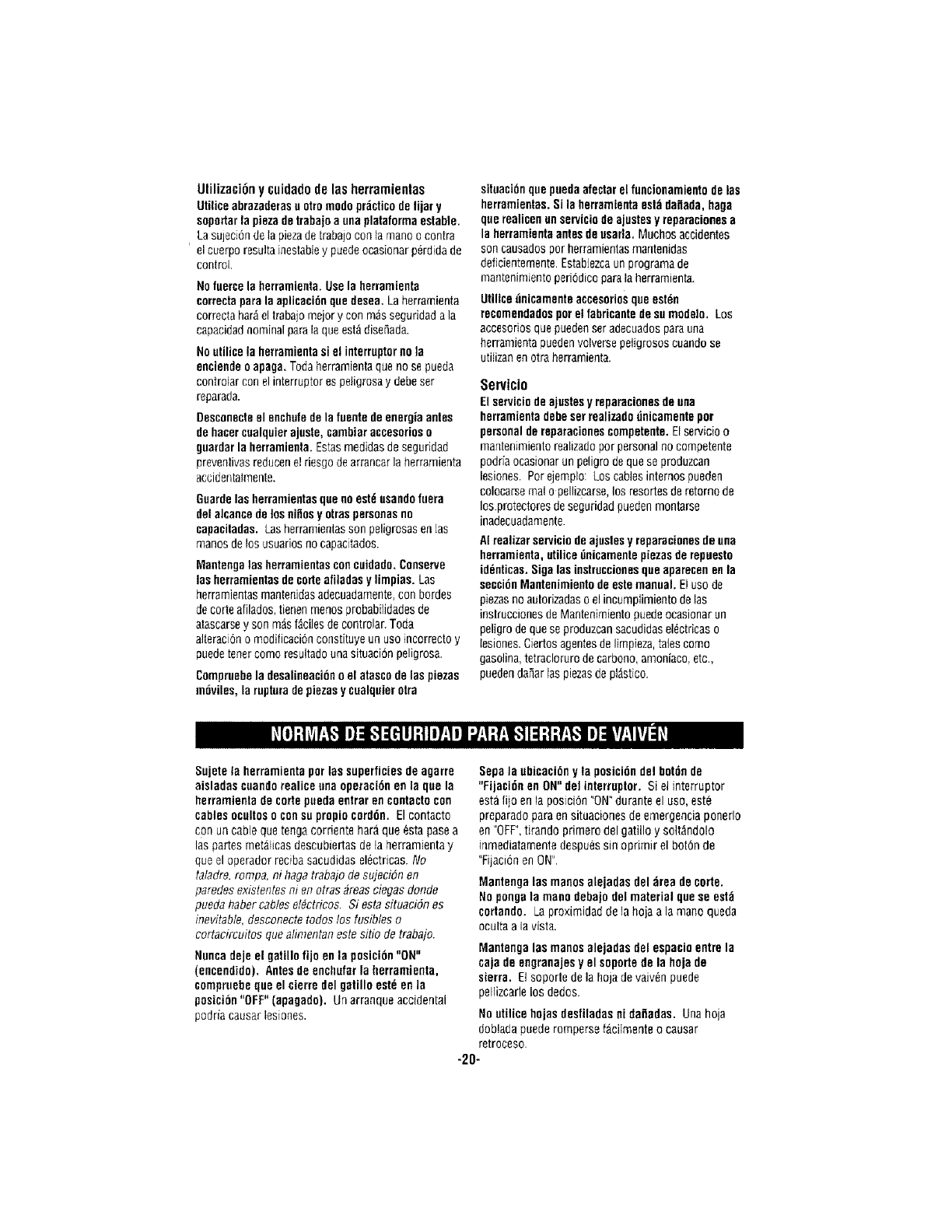
Utilizaci6n y cuidado de las herramientas
Utiliceabrazaderasn otrornodo pr;icticodelijar y
soportarla pieza detrabajoauna plataformaestable.
LasujecJ(Jnde la piezade trabajo con la mane o centre
el cuerpo resultainestabley puedeocasionar p_rdida de
control
Nofnerce la herramienta,Use la herramienta
correctapare la aplicaci6nque desea, La herramienta
correcta har_el trabajo reelery con m_s seguridad ala
capacidadnominal parelaque est_ diseSada.
No utilicela herrarnientasi el interruptornola
enciendeo apaga. Todaherramientaque no se pueda
controlar con e] interrupter es peligrosay debe set
reparada.
Desconecteel enchnfede la fuente de energiaantes
de hacercualquierajuste, carnbiaraccesorioso
guardarla herrarnienta.Estasmedidas de seguridad
preventivas reducenel riesgo de arrancar]a herramienta
accidentalmente.
Geardelas herrarnientasque noestd usandofnera
delaleance do los niiiosy otraspersonasno
capacitadas. Lasherramientas son peligrosas en las
manes de los usuariosno capacitados.
Nlantengalas herrarnientasconcuidado.Conserve
Insherrarnientasdocarte afiladas y lirnpias. Lax
herramientasmantenidasadecuadamente,con bordes
de corte afilados, tienenmenos probabflidadesde
atascarsey son m_sf_ciles de controlar. Toda
alteraci6no modificacion constituye un use incorrecto y
puedetenor come resultado una situacion peligrosa.
Compruebe la desalieeacidno el atascodoIns piezas
mdviles,la rupturedepiezasy cualquierolra
sitnacidnque puedaafectarel funcionarniento de las
herramientas.Si la herrarnlentaesl(idaflada, haga
que realicenun serviciode ajustesy reparacionesa
la herrarnientaantesde nsarla. Muchosaccidentes
son causadosper herramientasmantenidas
deficientemente.Establezcaun prograrnade
mantenimiento peri6dicc pare la herramienIa.
Utilicednicamente accesoriosque est_n
recomendadospot el fabricantede surnodelo. Los
accesorios que puedenser adecuadospara una
herramientapuedenvolversepeligrosos cuando se
utiiizan en otra herramienta.
Servicio
Elserviciode ajustesy reparacionesdo una
herrarnientadebeser realizado _nicamente par
personaldoreparacionescornpetente.Elservicio o
mantenimiento realizadoper personal no competente
podria ocasionarun peligrode que se produzcan
lesiones. Per ejemplo: Los cablesinternes pue(fen
colocarse real o pellizcarse,Ins resertes de retorno de
les.protectores de seguridad puedenrnontarse
inadecuadamente.
A[ realizerserviciode ajuslesy reparacionesde una
herramienta,utilice _nicarnente piezasderepuesto
id_nticas.Sioa las instrnccionesque aparecenen la
secci6nMantenirnientodoestemanual, Eluse de
piezasno autorizadaso elincumpiimiento de las
instrucciones de Mantenimiento puedeocasionar un
peligro de que se produzcansacudidas el_ctricaso
lesiones. Ciertos agentesde limpieza,tales come
gasolina, tetracloruro de carbeno, amoniaco,etc.,
puedendaSarias piezasde pl_stico.
Sujete la herramienta por las superficies de agarre
aisladas cuandorealice nnaoperacidn en la que la
berrarnienta de corfepueda entrar on contactocon
cables ocnltos o consu propiocord(_n. Elcontacto
con un cable que tonga corriente har(i que _sta pasea
las partes metalicas descubiertas de la herrarnienta y
que el operador reciba sacudidas eldctricas. No
taladre,romp& ni haga trabalo de sujeci6n en
paredes existeetes ni en otras areas ciegas donde
pueda haber cables el_ctricos. Siesta situaci6n es
inevitable, desconecte todos los fl]sibtes o
cortacflcuitos que alimentan este sitio de trabajo.
Nunca deje el gatille fije en la pesicidn"ON"
(encendido), Antesdo enchufarla herramienta,
cornpruebeque el cierre del gatillo est_ en la
posici(in "OFF" (apagado). Un arranque accidental
podria causer tesiones.
Sepa la nbicaci6n yla posici6ndel bet(in de
"Fijaci(Sn on ON"del interrupter. Si el interruptor
esta file en la posici6n "ON"durante el use, este
preparado para en situaciones de ernergencia ponerlo
en "OFF",tirando primero del gatillo y solt_ndolo
inmediatamente despuessin oprimir el botdn de
"Fijaci6n en ON".
Mantenga las manesalejadas del (irea do corle.
Nopongala rnano debajo del material quese est(i
cortando. La proximidad de la hoja ala mane queda
oculta a ia vista.
Mantengalasmanesalejadasdelespacioentrela
cajadoengranajesy el soportedela holede
sierra. EIsoportedela hojadevaiv_npuede
peHizcarlelos dedes.
Nontilicehojasdesliladasnidafladas. Unahoja
dobladapuederompersefaciimenteo causer
retroceso.
-20-
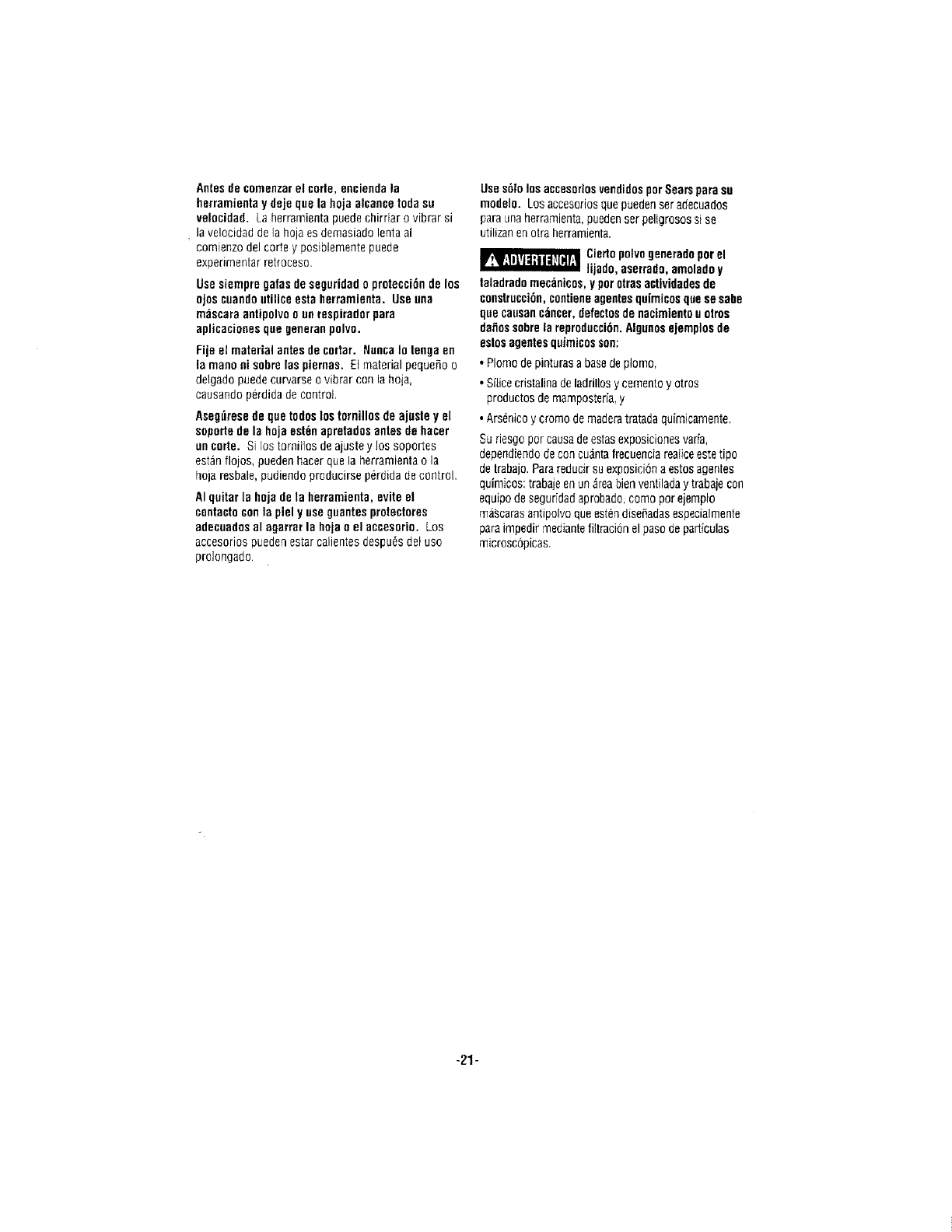
Antesdecnmenzaretcnrte,enciendala
herramientaydejeque lahnjaalcancetndasu
velncidad.Laherramientapuedechirriaro vibrarsi
lavelocidaddelahnjaesdemasiadolentaal
cnmienzodelcortey posiblementepuede
experimentarretrocese.
Usesiempregalasdeseguridadn protecci6ndeIns
njns cuandnatiliceestaherramienta.Useuna
mascaraantipnlvoounrespiradnrpara
aplicacinnesquegeneranpolvn.
Fijeel materialantesde¢ortar. NuncaInlengaen
la mannnisnbrelaspiernas.EimaterialpequeSoo
delgadopuedecurvarseo vibrarconlahnja,
causandoperdidade control.
Aseg_resedequetodnsInstnrnillnsdeajusleyel
sopnrtedela hnjaestenapretadnsantesdehacer
ancorte.Si instornillnsdeajustey Inssoportes
est;_nflojos, puedenhacerquela herramientan la
hojaresbale,pudiendoproducirsep_rdidadecontrol,
AIquitarla hojadela herramienta,eviteel
contactoconla plelyusegnantesprnlectnres
adecuadnsal agarrarla hojanel accesnrin.Los
accesnrinspuedenestarcaiientesdespu6sdel uso
prolongado
Use s61nIns accesnrinsvendidnspnrSearspara su
modeln. Los accesoriosque puedenser adecuadns
parauna I_erramienta,puedenser peligrosos si se
utilizan en otra herramienta.
Ciertnpnlvogeneradnpnr el
lijadn, aserradn,amnlado y
laladradomec_nieos, ypnrntrasactividadesde
cnnstrucci6n,cnntieneagentesquimicnsqnese sabe
que causanc_ncer, defectnsde nacimientou otrns
dafiossnbrela reprodocci6n.Algunns ejemplos de
eslosagentesquimicnsson:
•Plomo de pinturas a basede plomo,
• Sflicecristalina de ladrillos y cemento y otrns
productns de mampostefia,y
•Ars_nicn y cromo de maderatratada quimicamente.
Su riesgo pnr causade estasexposiciones varfa,
dependiendode con cu&ntafrecuenciareaticeestetipo
de trabajo. Parareducir suexpnsici6n a estos agentes
quimicos: trabaje en un ;_reabien ventilada y trabaje con
equipo de seguridad aprnbado,como pot ejemplo
mascarasantipolvo que estendise_adasespecialmente
para impedir mediante filtracion el pasode partfculas
microsc6picas.
-21-
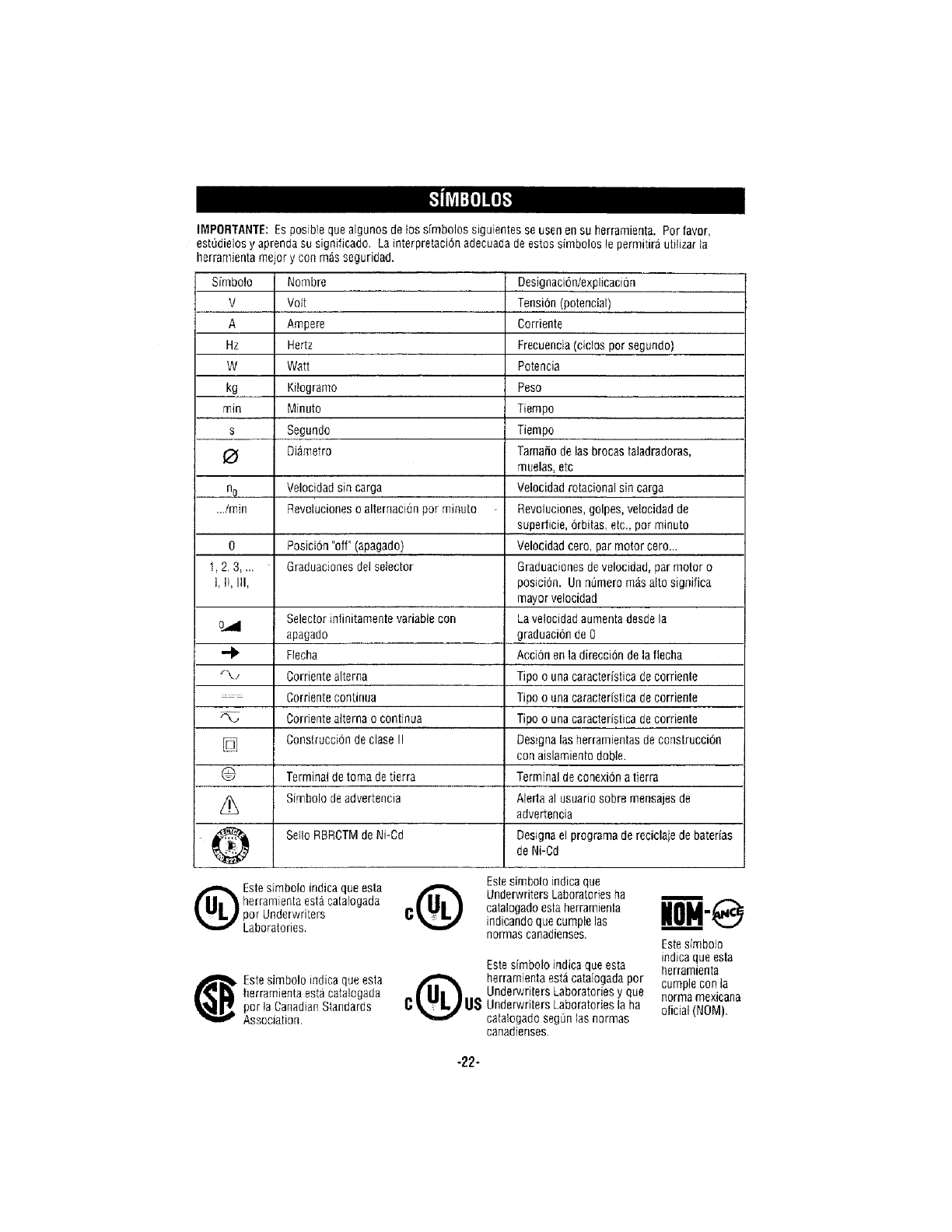
tMPORTANTE: Es posible que algunos de los sfmbolos siguientes se usen en su herramienta. Por favor,
estedielos y aprenda su significado, La interpretaei6n adeeuada de estos simbolos Is permitira utilizar la
herramienta meier y con m;_sseguridad.
Simbo!o Nombre Designaci6nlexpiicaci6 n
V Vnlt Tensi6n (potencial)
A Ampere Corriente
Hz Hertz Frecuencia(ciclos per segundo)
W Watt Potencia
kg Kitogramo Peso
rain Minute Tiempo
s Segundo Tiempo
0 Diametro Tamafio de las brocas taladradoras,
muelas, etc
nO Velocidad sin carga Velocidad rotacional sin carga
...imin Revoluciones o alternacion per minute Revoluciones, golpes, velocidad de
supedicie, 6rbitas, etc., per minute
0 Posici6n "off" (apagado) Velocidad eero, par motor cero...
1.2 3.... Graduaciones del selector Graduaciones develocidad, par motor o
I, II, III, position. Un n_mero m_s alto significa
mayor velocidad
Selector infinitamente variable con La velocidad aumenta desde la
o.,.dl apagado graduaci6n de 0
""_ Flecha Acci6n en la direeci6n de la flecha
"_\/ Corriente alterna Tipo o una caracteristica de corriente
Corriente continua Tipo o una caracteristica de corrienle
Corriente alterna o continua Tipo o una caracteristica de corriente
[] Construcci6n de clase I! Designa las herramientas de construction
con aislamiento doble.
0 Terminal de toma de tierra Terminal de conexi6n a tierra
t_ Simbolo de adverteneia Ateda al usuario sobre mensajes de
advertencia
_ Sello RBRCTM de Ni-Cd Designa el programa de reciclaje de baterias
de Ni-Cd
Esle simbolo indica que esta Q
herramienta esta catalogada
per Underwriters C
Laboratories.
Estesimbolo indica que
Underwriters Laboratories ha
catalogadoesta berramienta
indicandoque cumple las
norrnas canadienses.
Estesimbolo indiea que esta
herramienta esta catalogada
par la CanadianS_andards
Association.
Estesimbolo indica que esta
j_, herramienta est,1eatalogada per
I' | |l _ Underwriters Laboratories y que
C _Vll JU_ Underwriters Laboratories la ha
catalogado segun las normas
eanadienses.
Estesimbolo
indica que esta
herramienta
cumple con la
norma mexicana
oficial (NOM).
-22-
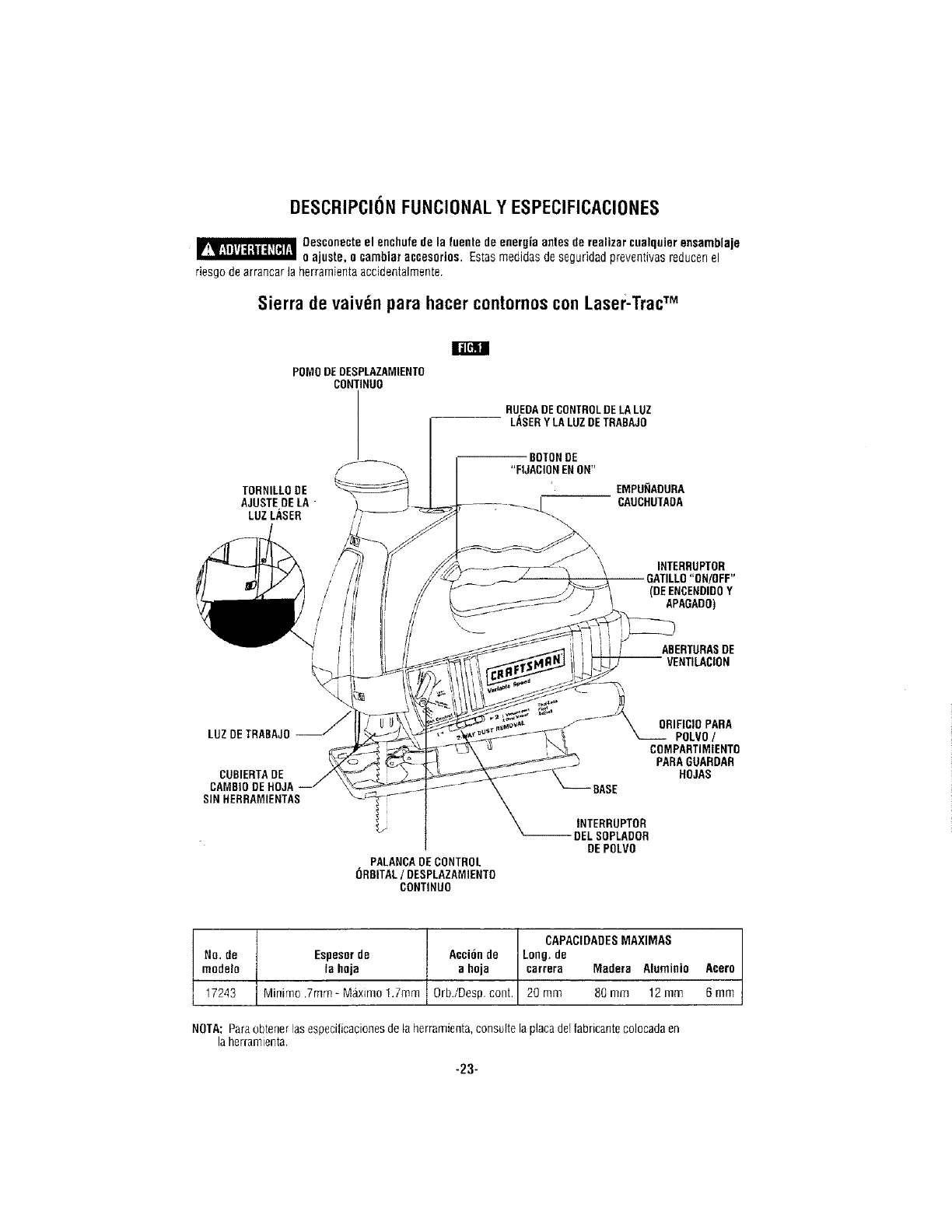
DESCRIPCI6N FUNCIONAL Y ESPECIFICACIONES
_esconecteel enchufe de la luente de energia anles de realizar cualquier ensamblaje
o ajuste, o cambiar accesorios. Estasmedidas de segufidad preventivas reducen el
riesgo de arrancar ia herramienta accidentalmente.
Sierra de vaiv_n para hacer contornos con Laser-TracTM
ll[_il
POM0DEOESPLAZAMIENTO
CONTINUO
BUEOADECONTROLDELALUZ
L/_SERY LALUZOETRABAJO
BOTONDE
/_'_, "FIJACIONENON"
TORNILLODE EMPU_ADURA
AJUSTEDELA ,-L CAUCHUTAOA
LUZLASER
INTERROPTOR
(DEENCENDIDOY
APAGADO)
ABERTURASDE
--VENTILACION
LUZDETRABAJO-/i
CUBIERTA DE
CAMBI0 DE HOJA
SIN HERRAMtENTAS
PALAXCADECONTROL
_RBITAL/DESPLAZAMIENTO
CONTINUO
BASE
INTERRUPTOR
--DEL SOPLADOR
DEPOLVO
0RIFICIOPARA
POLVO/
COMPARTiMIENTO
PARAGUARDAR
HOJAS
CAPACIDADESMAXIMAS
No. de Espesorde Accionde Long.de
modelo la hoja a hoja carrera Madera Aluminio Acero
17243 Miriirno .7mm- M_,ximo1,Tram Orb./Desp. cont. 20 mm 80 turn 12 mm 6 mm
NOTA: Paraobtener las especificacionesde la herramienta, consulte la placa de] fabricantecolocadaen
la herramienta.
-23-
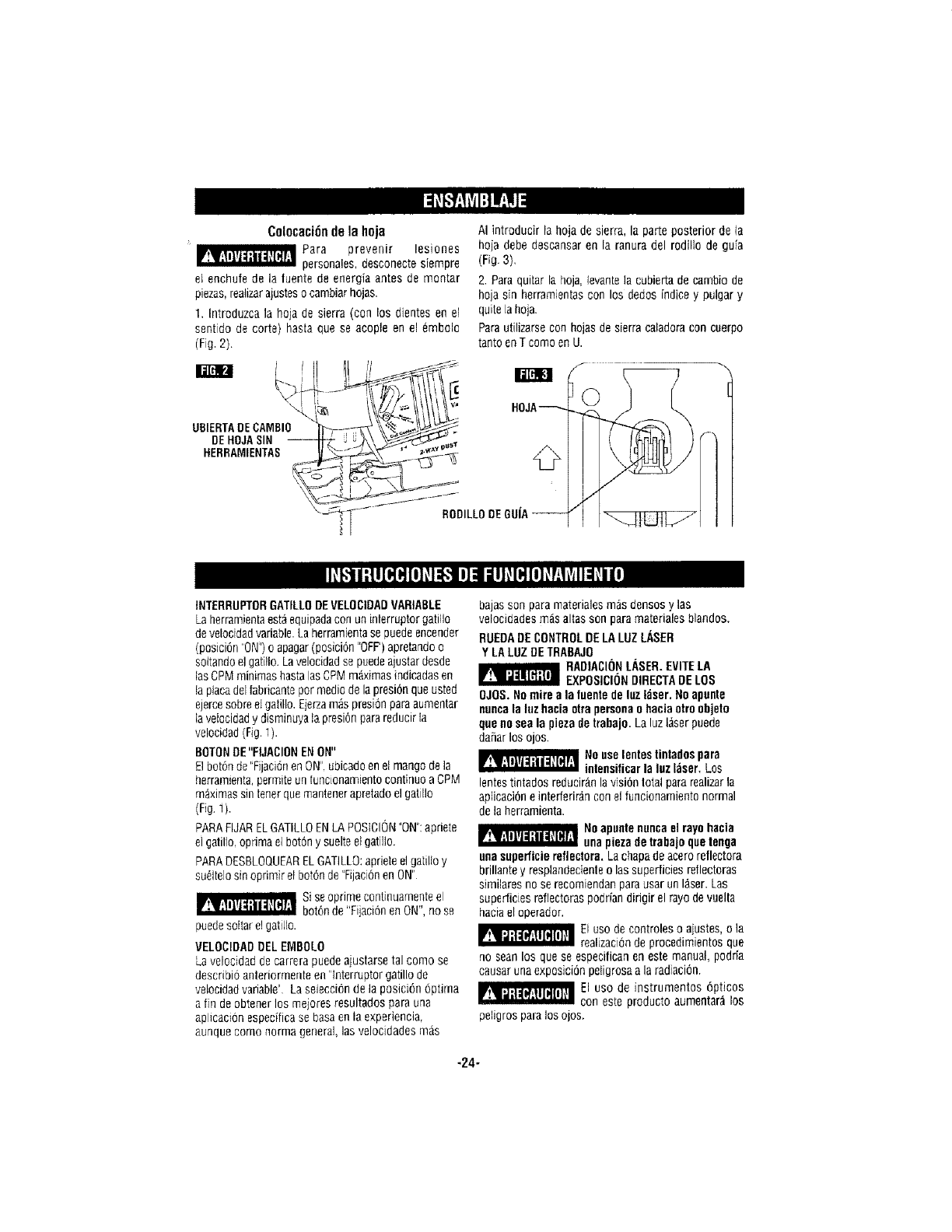
Colocaci6n de la hoja
_ Para prevenir lesiones
personales, desconecte siempre
el enchufe de la fuente de eoergia antes de montar
piezas,realizarajustes o cambiar hojas.
1. Introduzca la hoia de sierra (con Ins dientes en el
sentido de corte) hasta que se acople en el embele
(Fig 2).
AI introducir la hoja de sierra, la parte posterior de la
hoja debe descansar en la ranura del rodilio de gufa
(Fig. 3).
2. Para quitar la hoja, levante la cubierta de cambio de
hoja sin herramientas con Ins dedos indice y pulgar y
quite la hoja.
Para utilizarse con hejas de sierra caladoracon cuerpo
tanto en T como en U.
UBIERTADECAMBIO
DEHOJASIN
HERRAMIENTAS
HOJA
, gas1
RODILLODEGuJA-- ,JtUIL J
INTERRUPTORGATILLODEVELOCIDADVARIABLE
La herramientaest,,equipadacon un inlerruptor gatfllo
de velocidadvariable.La herramientase puedeeneender
(posici6n "ON')o apagar(posici6n "OFF')apretandoe
sottando el gatillo. Lavelocidadse puedeajustar desde
lasCPM minimas hastalas CPMm_ximasindicadasen
ta placadel fabbcante por medio de la presi6n que usted
ejercesobreel gatillo. Eierzam_s presion paraaumentar
ta veIocidady disminuya ta presi6n para reducir la
velocidad (Fig.1).
BOTONDE"FIJACIONEN ON"
El bot6n de"Fijaci6nenON".ubicado enel mangode la
herramienta,permiteun funcionamientocontinuo a CPM
m_ximassin tenorque mantenerapretadoel gatillo
(Fig.1).
PARAFIJARELGATILLOENLA POStCION"ON":apriete
eJgatillo, optima el bot6ny suelteel gatillo.
PARADESBLOQUEAREL GATILLO:aprieteel gaIiltoy
su_ite]osin oprimir el bot6nde "Fijacionen ON"
Si seoprime continuamenteel
bot6n de "Fijacion en ON", no se
puedesoltar elgatil]o.
VELOCIDABDEL EIVIBOLO
La velocidad de carrera puede aiustarse tal como se
describio anleriormente en "lnterruptor gatillo de
velocidadvariable". La seieccion de la posici6n optima
a fin de obtener Ins meiores resultados para una
aplicaci6n especiflca se basaen la experiencia,
aunque como norma general, las velocidades mas
bajas son para materiales mas densos y las
velocidades m_s altas son para materiales blandos.
RUEDADE CONTROLDE LALUZ L_,SER
Y LALUZ DETRABAJO
_RADIACIONLASER.EVITELA
EXPOSICI(]NDIRECTADELOS
OJOS.No mire a la fuente deluz Idser. No apunte
nuncala luz hasiaotra personao hacia otroobjeto
queno sea la piezade trabajo. Laluz I_serpuede
da_ar ins ojos.
Nouse lentestintadospare
inlensificarla luz laser. Los
lentes tintados reduciranla visi6n total para realizarta
aplicaci6ne interferiran con el funeinnamiento normal
de la herramienta.
No apantenunca el rayo hacla
una pieza detrabajo quelenga
ariasuperficiereflectora, La chapade acorn reflectora
brillante y resplandecienleo las superficies reflectoras
similares no se recomiendan para usar un 19ser.Las
superficies refleetoraspodrian dirigir el rayo de vuelta
hacia el operador.
Ei uso de eontroles o ajustes, o la
realizacionde proeedimientos que
no sean Ins que se especifican en este manual, podria
causar una exposici6n peligrosa a la radiaci6n.
Ei uso de instrumentos 6prices
con este producto aumentara Ins
peligros para ins ojos.
-24-
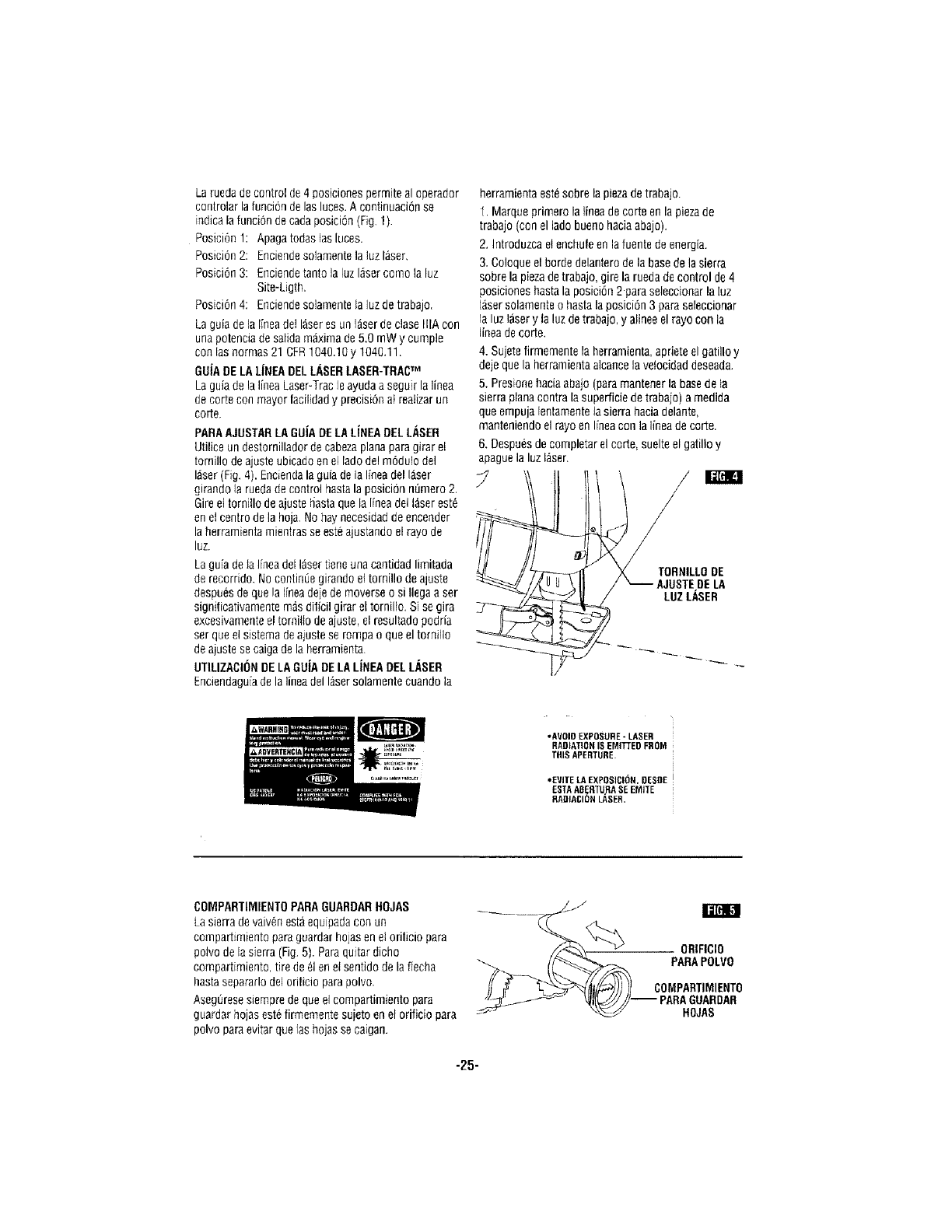
La rueda de control de 4 posicionespermite al operador
controlar la funci6n de los luces.A continuaci6n se
indica la funci6n de cadaposisi6n (Fig,1).
Posici6n 1: Apagatodas las luces.
Posicion 2: Enciendesolamente la tuz I_ser,
Posici6n 3: Enciendetanto ia luz I;_sercome la luz
Site-Ligth,
Posici6n 4: Enciendesdamente ta luz de trabajo.
La guiade la fineadel I;_seres un laserde claseIliA con
una potencia de salida m_iximade 5.0 mW y cumpie
con las normas 21 CFR1040.10 y 1040.11.
GUiADE LALiNEADELLASERLASER-TRACTM
La guia de ia IfneaLaser-Tracle ayudaa seguir la linea
de eorte con mayor facilidad y precisi6n al realizar un
code,
PAFIAAJUSTARLAGUIADELALiNEADELLASEI_
Utilice un destomillador de sabezaplana para girar el
tomillo de ajuste ubicado en el lads del m6dulo del
laser(Fig. 4). Enciendala guia de ia I[neadel I&ser
girando la rueda de control hastala posici6o nQmero2,
Gireel tornillo de ajuste ,haslaque la Ifnea delI_.serest_
en el centre de la hoja,No hay necesidadde encender
la herramientamientras se esteajustando el rays de
luz.
La guia de la If_leadel laser tieneuna cantidad limitada
de recorrido, No contim]e girando e{ tornillo de aluste
despues de que la Ifneadeje de moverse o si Ilegaa set
signiticativamente masdiffcil girar el tornillo, Si se gira
excesivanrenteel tornilto de ajuste, el resultado podrfa
ser que el sistema de ajuste se rompa o qne el tornilin
de ajuste se caigade la herramienta.
UTILIZACI(}NDELA GUiADE LALiNEADELLASER
Enciendagu2ade la linea del I_sersolamente cuando ia
herramienta estesobre lapieza de trabajo.
1, Marque primers lalinea de code en la piezade
trabajo (con el lads bueno hacia abajo)+
2. Introduzca el eochule en la fuente de energia.
3, Cdoque el borde delanterode la basede la sierra
sobre la pieza de trabajo, gire larueda de control de 4
posiciones hastala posici6n 2 paraseleccionar la tuz
l_sersolamente ohasta laposici6n 3 paraseleccionar
la luz I;_sery ta luzde trabajo, y alineeel rays con la
ifneade code.
4. Sujete firmemente la herramienta,apriete el gatillo y
dejeque la herramierltaalcancela veiocidad deseada.
5. Presionehacia abajo (paramantener la basede la
sierra piano contra lasuperficie de trabajo) a medida
que empuja lentamentela sierra hacia delante,
manteniendod rays en Ifneacon la Ifneade code.
6, Despues de completar el corte suelte el gatillo y
apague la luz I_ser,
TORNILLODE
AJUSTEDELA
LUZLASER
li[_ _]
•A_OIDEXPOSURE-LASER
RADIATIONIS EMITTEO FROM
THIS APEeTURE.
• EVITE LA EXPOSICIONr DESDE
ESTAABEFITU_ASE EMIle
RADIACION LASER.
COMPARTIMIENT0PARAGUARDARHOJAS
La sierra de vaiv6nesta equipadacon un
compartimiento paraguardarhojas en el orilicio para
polvo de lasierra (Fig, 5). Para quJtardiche
compartimiento, tire de 61en et sentido de laflecha
Ilasta separarlo del orilicio para polvo.
Aseguresesiempre de que el compartimiento para
guardar hojas estefirmemente sujeto en el orificio para
polvo para evitar que/as hojas se caigan.
ORIFICIO
PARAPOLVO
HOJAS
-25-
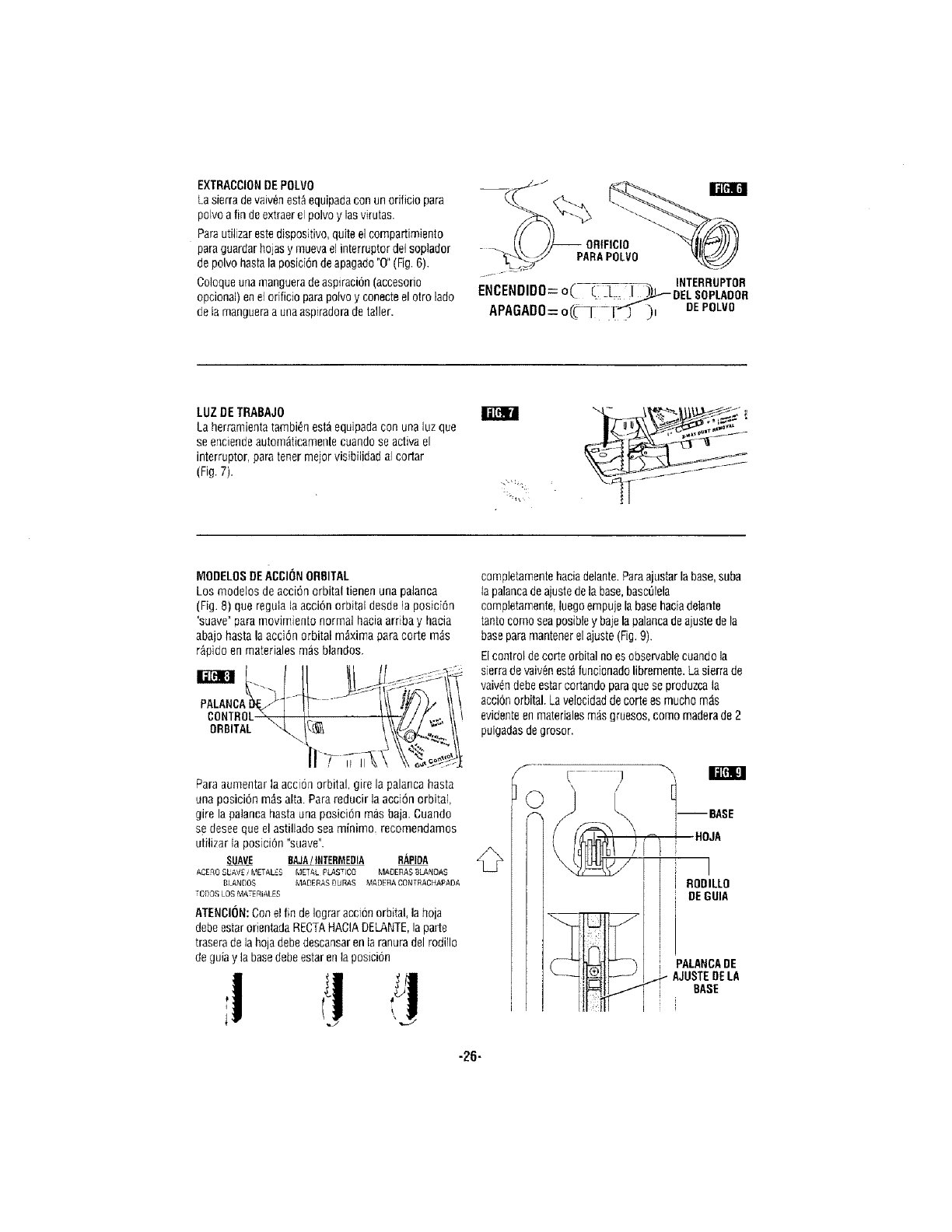
EXTRACCIONDEPOLVO
La sierrade vaiv_nest_equipadacon un orificio para
polvo a fin de extraerel polvo y lasvirutas.
Parautilizarestedispositivo, quite ei eompartimiento
paraguardar hojasy muevael interruptor del soplador
de polvo hastala posici6n de apagado"0" (Fig,6).
Coloqueuna manguerade aspiraci6n(accesorio
opcionai) en el orificio para polvo y conecteel otro lado
de ia mangueraa unaaspiradorade taller.
PARAPOLVO
INTERRUPTOR
ENCENDIDO=o( _ _DELSOPLAOOR
APAGADO--.o_-I--F _ )l DEPOLVO
LUZ DE TRABAJO
La herramientatambi_n est;i equipadacon una luz que
se eociendeautoroaticamentecuando se activael
interruptor, paratenermejor visibiiidad al cortar
(Fig.7).
IIIPlll "._,,.__/_I;._,_.-,,_•
MODELOSDEACCI(]NORBITAL
Los modelos de acci6n orbital tienen una palanca
(Fig. 8) que regula ia acci6n orbital desde la posicf6n
'suave' para movimiento normal hacia arriba y hacia
abajo hasta la acci6n orbital m_xima para corte m_s
r_pido en materiales mas blandos.
I_[_!_]
PALANCP
CONTROL
ORBITAL
Para aumentar la acci6r] orbital, gire la palanca hasta
una posici6n mJ.salta. Para reducir la accic_norbital,
gire la palanca hasta una pesici6n mas baja. Cuando
se deseeque el astiliado seaminimo, recomeodamos
utilizar ia posiciOn"suave".
SUAVE BAJA/IHTERMEDIA RAPIDA
ACE_O SUAVE _ METAL__S MET&L PLASTICO MAOERAS BLANDAS
BL ANDOS MADERAS DURAS MADERA CONTRACHAPADA
TODOS LOS MAT_ Rill ES
ATENCI()N:Conel fin de Iograracci6norbital, la hoia
debe estarobentadaRECTAHACIADELANTE,la parte
trasera de la hojadebedescansaren la ranuradel rodiNo
de guia y la base debeestaren iaposici6n
completamentebaciadelante. Paraajustar la base, suba
ta palancade ajuste de la base,basclJlela
completamente,luegoempuje la basehaciadelante
tanto como seaposibley bale lapalancade ajuste de la
baseparamantenerelajuste (Fig.9).
Elcontrol de corte orbital no es observablecuando la
sierrade vaivenestafuncionadolibremente. La sierra de
vaiv6ndebeestar cortandoparaque se produzcala
acci6norbital. La vetocidadde cortees mucho mAs
evidenteee materialesmas gruesos,como maderade 2
pulgadasde grosor.
_\ !--BASE
i,,I A
i RODILLO
DEGU]A
i t,..J PALANCADE
-26-
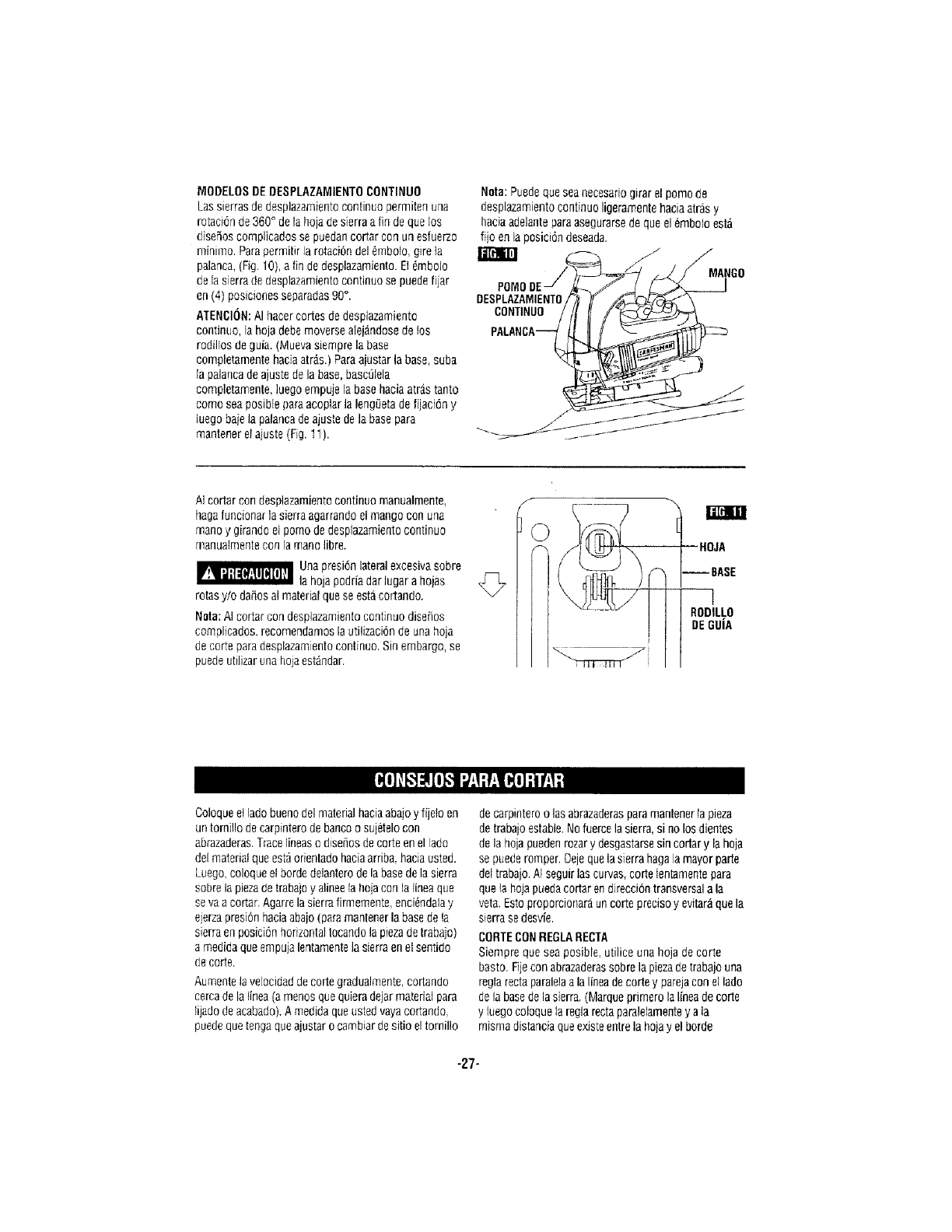
MODELOS DE DESPLAZAMIENTO CONTINUO
Lassierras de desplazamientocontinue permiten una
rotaciCnde 360° de la hojade sierraa fin de que los
dise_os complicados se puedancortar con un esfuerzo
minima. Parapermitir la rotaciCndeJ_mbolo, gire ta
palanca,(Fig. 10), a fin de desplazamiento.El _mbolo
de la sierra de desplazamientocontinue se puedelijar
en (4) posiciones separadas90°.
ATENCION:AI I]acer cortes de despiazamiento
continue, la hoja debemoverse alej#,ndosede los
rodillos de guia. (Mueva siempre la base
completamente haeiaatr_ts.)Paraajustar la base,suba
ta palancade ajuste de la base,basct_lela
completamente, luego empuje ia base haciaatRis tanto
come sea posible paraacopiar la lengiJetade fijaniCny
iuego bajela palancade aluste de la base para
mantener el ajuste (Fig. 11).
Nota: Puedeque seanecesariogirar el paine de
desplazamientocontinue ligeramente haciaarrasy
hacia adelantepara asegurarsede que el 6mbolo est;_
fijo en laposicion deseada.
POMODEJ_ _j Y_X.____
DESPLAZAMIENTO/_'_ _--
CONTINUO I_v'__
PALANCA'--'-_]]1 __
A] coriar con desplazamientecontinue manualmente.
hagafuncionar la sierra agarrando el mango con una
maney girando et paine de desptazamientocontinue
rnanualmentecon fa mane libre.
Una presiCnlateralexcesivasabre
la hola podrfa dar lugar a holas
rotas y/o dagosal material que se est_icortando.
Nota: AI eortarcon despiazamientocontinue disefios
complicados, recomendamos la utilizaciCnde una hoja
de carte para despiazamientocontinue. Sin embargo, se
puede utilizaruna hojaest_ndar.
f
li_, 1 HOJA
Coloque et ]adobuenadel materialhaciaabajoy fijelo en
un tornillo de earpinterode bancoo sujetelocon
abrazaderas.Tracelineaso dise_osde carte en el lade
del material que esta orienlado haciaarriba, hacia usted.
Lueg& coloqaeel horde delanterode la basede la sierra
sabre la piezade trabatey alinee lahoja con la linea que
seva a cortar. Agarre lasierrafirmemente, enci_ndalay
ejerzapresi6n haciaabajo(paramantenerla base de fa
sierra en posicion horizontaltocando la piezade trabajo)
a medida que empuia lentamentelasierra en el sentido
de code.
Aumente lavelocidadde carte gradualmente,cortando
cerca de la lfnea (amenos que quieradejar material para
tijadode acabado).A rnedidaque usted vayacortan(lo,
puedeque tongaque ajustar o cambiar de sitio el tornillo
de carpinteroolas abrazaderaspara manlenerla pieza
de trabajoestabie.No fuerce la sierra,si no los dientes
de la hojapuedenrozar y desgastarsesin cedar y la hoja
se puederomper,Dejeque la sierra hagala mayor parle
deItrabafo, AI seguirlascui_as,corie lentamente para
que la hojapuedacedar en direcei6ntransversala la
vet& Estoproporcionara un carte precise y evitar;_que la
sierrase desvie.
CORTECONREGLARECTA
Siempre que sea posible, utilice una hoja de carte
bast& Fijecon abrazaderassabre la piezade trabajouna
reglarecta paralelaa la lineadecarte y parejacon el lade
de la basede la sierra. (Marque primero lalinea de eerie
y luegoeoiaque la reglarectaparalelamentey a ia
rnisma distaaciaque existeentre la heray el borde
-27-
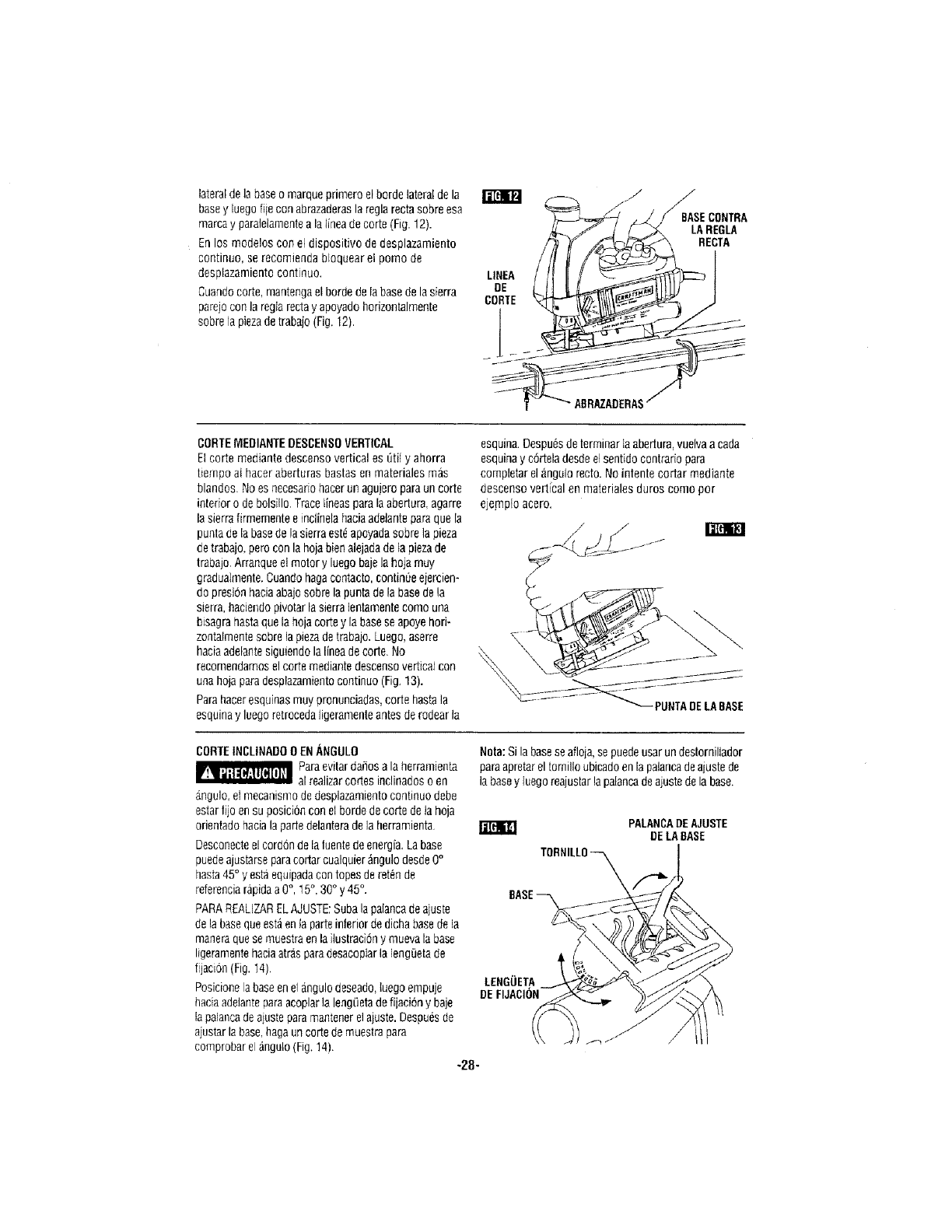
lateralde la base o marqueprimero el horde lateral de la
basey luegofiiecon abrazaderasla reglarecta sobre esa
marca y paralelamentea la lineade corte (Fig. 12).
En los modelos con el dispositivo de desplazamiento
continuo, se recomienda bloquear el pomo de
desplazamiento continuo.
Cuandccorte, mantengael borde de la basede la sierra
parejocon la regta rectay apoyado horizontalmente
sobre la piezade trabajo (Fig. 12),
CORTEMEDIANTEDESCENSOVERTICAL
Elcorte mediante deseensovertical es titil y ahorra
[iempo at hacer abeduras bastas en materiales mas
blandos. No esnecesario_acerun agujero para un corte
interioro de bolsillo.Trace ffneaspara laabedur& agarre
Issierra tirmemente e inclinelahacia adelanteparaque la
punlade la base de lasierra estdapoyadasobre la pieza
de trabajo, pero con la hojabienalejadade la piezade
lrabajo.Ar[anque el molor y luegobajela hoia muy
graduaimente.Cuandohagacontacto,continOeejercien-
do presi6nhaeiaabajosobre la puntade la basede Ia
sterra, baciendopivotar la sierralentamentecomo una
bisagrailasta que la hojacortey la baseseapoyehori-
zontalmentesebre la piezade trabajo.Luego,aserre
hacia adelantesiguiendo la linea decode. No
recomendamosel corte mediantedescensovedical con
una hoja paradesplazamientocontinuo (Fig, 13).
Parahaceresquinas muy pronunciadas,corte hasta]a
esquinay luego retrocedafigeramenteantes derodear la
esquina.Despu_sde terminar taabedura, vuelva a cada
esquinay cSrteladesdeelsentido contrario para
completar eianguio recto. No intente cortar mediante
descensovertical en materiales duros como pot
ejemplo acero.
CORTEINCLINADOOEN ANGULO
_Para evitar dafios a la herramienta
al realizarcodes inclinadoso en
_,ngu]o,et nrecanismode desplazamientocontiouo debe
estarlijo en su posicion con el borde de corte de Iahoja
orientadohaciala partedelanterade ia herramienta
Desconecteelcord{_nde la luentede energia.La base
puedeajustarseparacortar cualquier&ngulodesde 0°
basra45° y est,_equipadacontopes de retch de
referenciarapidaa 0°, 15°, 30° y 45°.
PARAREALIZARELAJUSTE:Suba lapalancade aiuste
de la baseque estaen la parteinlerior de dicha base de la
maneraque semuestraen la iluslracibn y mueva labase
ligeramentehaciaarrasparadesacoplarla lengQetade
fijacion (Fig. 14).
Posicionelabase en elangulodeseado,luegoempuje LENGIJETA
DE FIJACli)N
haeiaadelanteparaacoplar la leng[ietade fijacion y baje
la palancade aiustepapamantenerelajuste. Despuesde
aiustar labase,hagaun ccrte de muestrapara
comprobarel angulo(Fig.14).
-28-
Nota: Si la baseseafloja, sepuedeusar un destorniliador
paraapretarel tomi!lo ubicado en iapalancade ajuste de
la basey tuegoreajustarla palancade ajustede la base.
PALANCADEAJUSTE
DELABASE
I
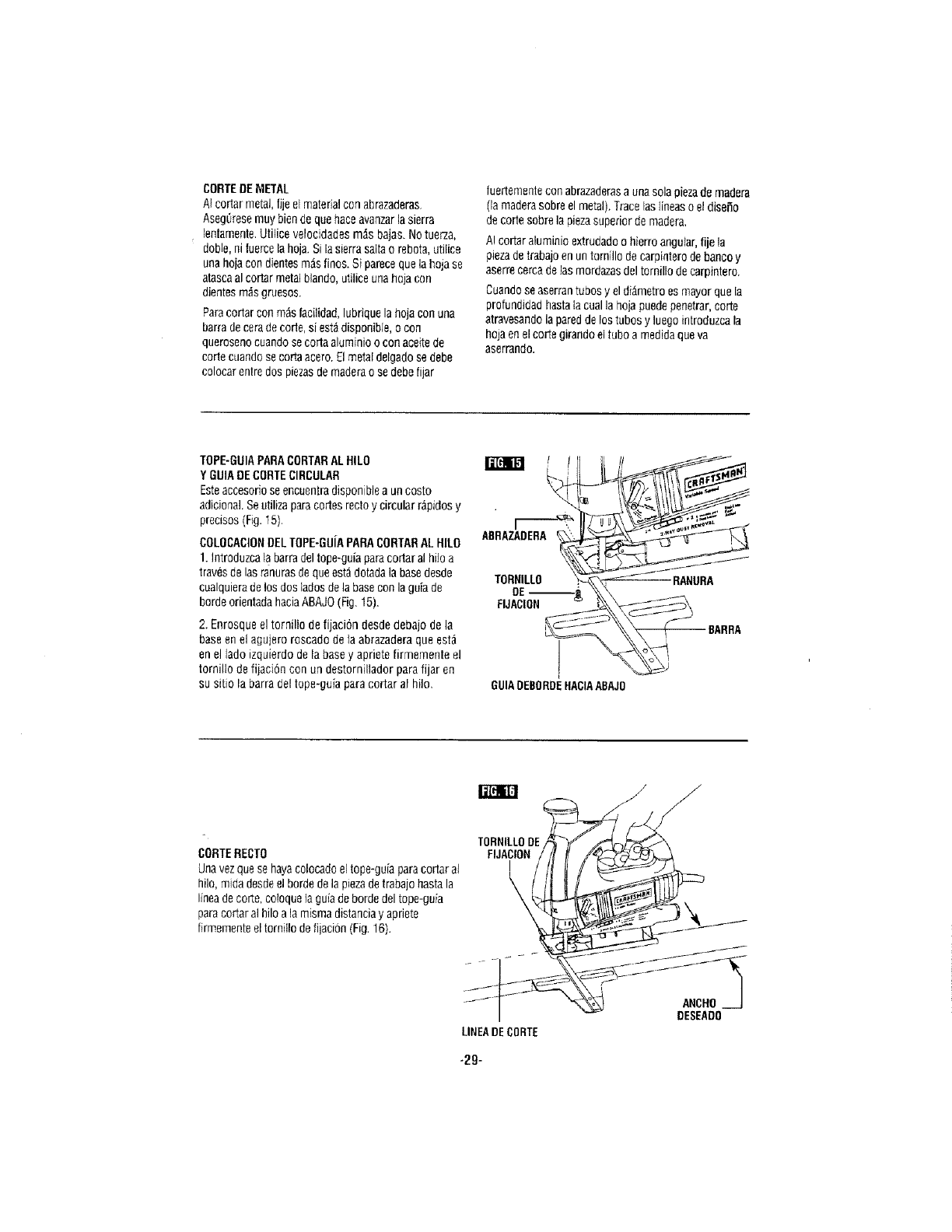
CORTEDEMETAL
AI cortar metal,fJjeei materialcen abrazaderas.
AsegOresemuy biende que haceavanzarla sierra
lenlamenle. Utiliee velocidades m_s bajas. No tuerza,
doble,ni luerce la hoja.Si lasierra saltao rebota, utilice
una hoiacon dientesmas fines. Si pareceque la hojase
atascaal cortar metalblando,utilice unaheja con
dientesm_s gruesos.
Paracortar conm_s facilidad,lubrique la hojacon una
barrade cerade code,si esta disponible, o con
querosenocuando secoda aluminio o conaceite de
cortecuandose eortaaeero. Elmetaldelgadose debe
colocar entre dos piezasde madera o se debefijar
tuedemente con abrazaderasa una sola piezade madera
(la maderasobre el metal).Trace las lineaso el dise5o
de code sobre ]apiezasuperior de madera.
AI cortar aluminio extrudado o hierro angular,fije la
piezade trabajo en un torniilo de carpinterode bancoy
aserrecerca de iasmordazasdel tornillo de earpintero.
Cuandoseaserrantubes y el di_.metroes mayor que la
profundidad hastala cual ]a _oiapuede penetrar,eorte
atravesandola paredde los tubes y luego introduzcala
hojaen el corte girando eitube a medidaque va
aserrando.
TOPE-GUIAPARACORTARAL HILO
Y GUIADECORTECIRCULAR
Esteaccesorio se encuentradisponiblea un costo
adicionaLSe utiliza paracodes rectoy circular r_pidos y
precisos(Fig.15).
COLOCACIONDELTOPE-GUIAPARACORTARAL HItO
1. ]ntroduzcala barradeltope-guiaparacortar al hilo a
tray, s de las ranurasde queest_dotadala basedesde
cualquierade los dos lades de labase con la guia de
borde orientadahaciaABAJO(Fig. 15).
2. Enrosque el torni!lo de fijaci6n desde debajo de la
baseen el aguiero roscado de Ia abrazadera que esta
en el lade izquierdo de la base y apriete lirmemente el
tomillo de fijaci6n cen un destorniliador para fijar en
su sitie la barra del tope-gufa para cortar aFhilo.
ASRAZADERA
TORNILLO
DE--_
FIJACION
GUIADEBORDEHACIAABAJO
--' RANURA
CORTERECTO
Unavez que se hayacolocadoel tope-guia paracedar al
bile, midadesdeel bordede Ispieza detrabajo basrala
lineade co[re, coloque laguia de be[de del tope-guia
para cortar al bile a la misma distanciay apriete
firmemente eltornillo de fijacion (Fig. 16).
TORNILLODE
FIJACION
LINEADECORTE
ANCHO
DESEADO
-29-
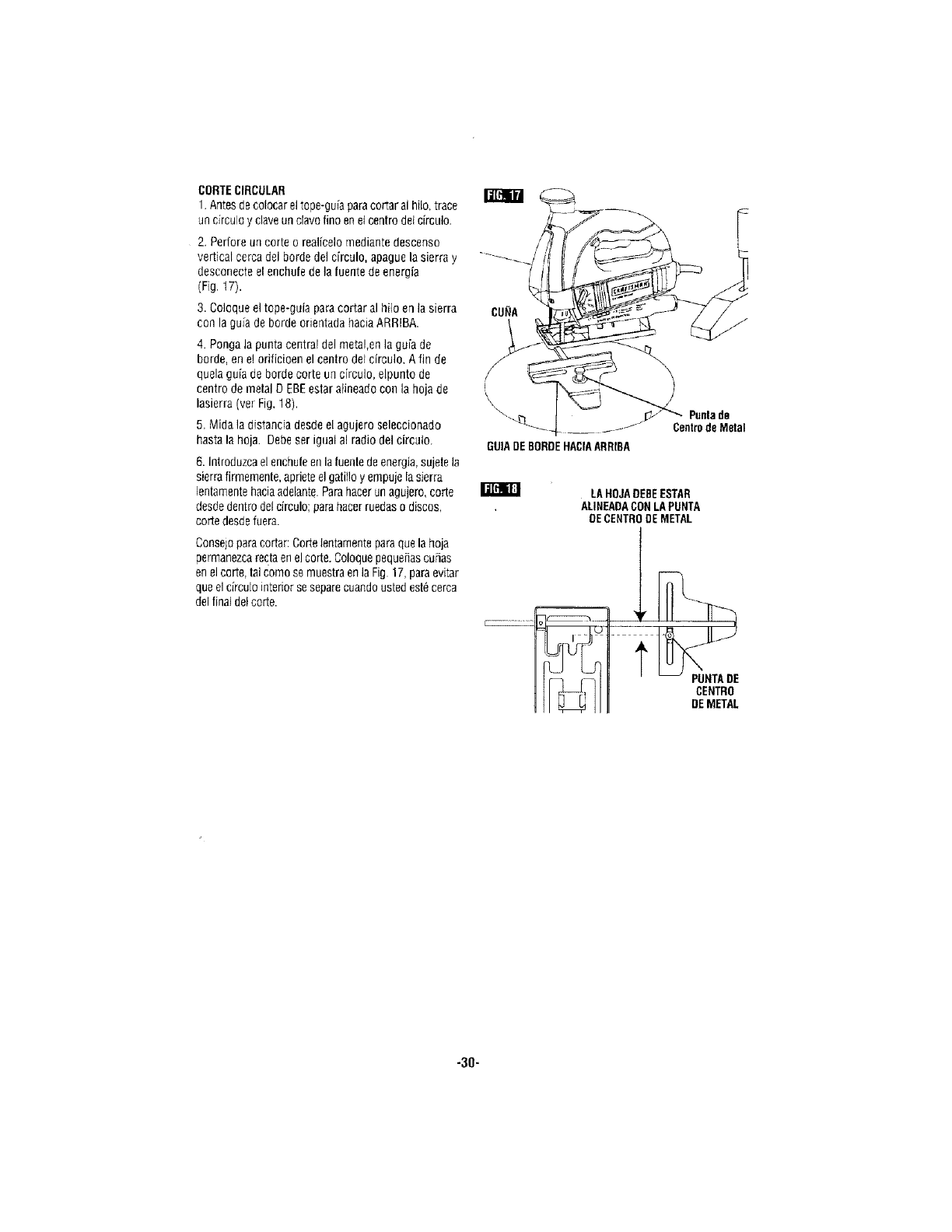
CORTECIRCULAR
1. Antesde coIocar eltope-gu[a para cor_aral hiIo, trace
un drculo y claveun clavofino en el centrodet circuIo.
1[ef il'J
2. Per[ore un corte o realicelo mediante descenso
vedical cercadel borde de] circulo, apague la sierra y
deaconecfe el enchufe de la fuente de energia
(Fig. 17).
3. Coloqueel tope-guia para cortar al hilo en la sierra
con la gu[a de borde orientada hacia ARRIBA.
4. Pongala punta central del metal,on la gu[a de
borde, en e! orificioen el eentro del cireulo. Afin de
quela guia de borde corte un c[rculo, elpunto de
centro de metal D EBEestar alineado con la hoja de
lasierra (ver Fig. 18),
5. Mida la distancia desdeel agujero seleccionado
hasta la hoja Debeser igual al radio de] circuto.
6. Introduzcael enchufeen la luenle de energia,sujete la
sierrafirmemente,apfieteel gatiI!oy empujela sierra
lentamentehaciaadelante.Parahacer unagujero, code
desde dentro delcirculo; para hacerruedas o discos,
corte desdefuera.
Consejoparacodar: Cortelentamenteparaquela hoja
permanezcarectaen el corte. Coloquepeque_ascuSas
en elcode, tel como se muestraen la Fig. 17, para evitar
queel circulo interior se separecuandoustedestecerca
dei final del code.
CUbA
/
\\\
GUIADEBORDEHACIAARRIBA
Punlade
Centrode Metal
LAHOJADESEESTAR
ALINEADACONLAPUNTA
DECENTRODEMETAL
l t--b
-30-
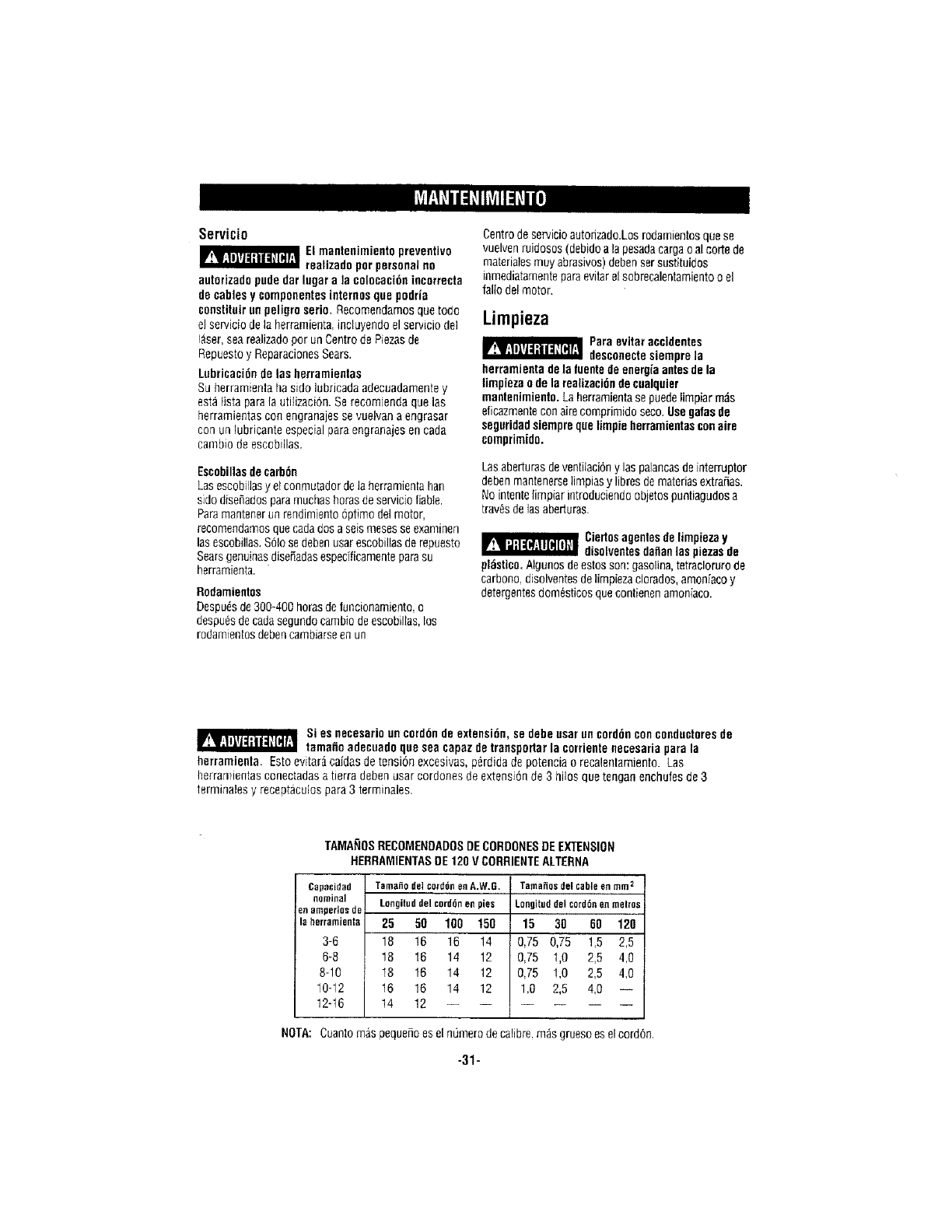
Servicio
El manlenimiento preventive
realizado per personalno
autorizadopude dar lugar a la colocaci6nincorrecta
de cables y componentesinternes que podria
constituirun peligro serio, Recomendamos que todo
el servicio dela herramient& incluyendo el servicio de]
laser, searealizadoper un Centre de Piezasde
Repuestoy ReparacionesSears.
Lubricaci6n de las herramienlas
Su herramienla ha sido iubdcada adecuadamente y
esta lista para la utflizaci6n. Se recomienda que las
herramientas con engranajes se vuelvan a engrasar
con un lubricante especial paraengranajes en cada
cambio de escobiilas.
Escobillasdecarb6n
Losescobfllasy el conmutadorde la herramienla hen
sido disefiadospara muchas horasde servicio fiabie.
Paramantenerun rendimiento6primo del motor,
recomendamosque cadadosa seismeses se examinee
las escobilla& S{_losedeben usarescobillas de repuesto
Searsgenuinasdise_adasespecificamenteparasu
herramienta.
Rodamientos
Despudsde 300-400 horas de luncionamiento,o
despuesde cadasegundocambio de escobillas, los
rodamientos debencambiarseen un
Centro de servicio autofizade.Losrodamientos que se
vuelvenruidosos (debidoa la pesadacargao al corte de
materialesmuy abrasivos)debenser sustituidos
inmediatamentepara evitar el sobreealentamientoo el
falle del motor.
Limpieza
_Para evitar accidentes
desconectesiempre la
herramienta dela luentede eeerg[aantesde la
limpiezao de la realizaci6ndecualquier
mantenimiento. Laherramientase puedelimpiar m_s
eficazmentecon airecomprimido seco. Usegafasde
seguridadsiempre que limpie herramientasconaire
comprimido.
Lasaberturasde ventilaci6n y las palancasde irlterruptor
deben mantenerseIimpiasy libres de materiasextra5as.
No intentelimpiar introduciendo objetospuntiagudosa
trav6sde ]asaberturas.
_Cieilosagenlesde limpieza y
disolventesdoriantaspiezasde
plastics,Algunosde estos son: gasolina,tetracloruro de
carbon& disolventes de limpiezaciorados, amon[aeoy
detergentesdom_sticos queeontienenamoniaeo.
Si es necesario un cord6nde extensi6n, se debe usar un cordbn conconductoresde
tamafio adecuado que sea capaz de transporterla corriente flecesaria pare la
herramienta. Esto evitar6,caidas de tensi6n excesivas, perdida de poteneia o recalentamiento. Las
herramientas conectadas a tierra deben usar cordones de extensi6n de 3 hiios que tengan enchufes de 3
terminales y reeept_iculospara3 terminales.
TAMANOSRECOMENDADOSDECORDONESDE EXTENSION
HERRAMIENTASDE 120 V CORRIENTEALTERNA
Capacidad
nominal
enomperissde
la herramienta
3-6
6_8
8-10
10-12
12-16
Tamafiode]cordonenA.W.G.
Leogituddelcord6nenpies
25 50 100 150
18 16 16 14
18 16 14 12
18 16 14 12
16 16 14 12
14 12
Tamaflosdelcableenmm2
Longituddelcord6nenmetros
15 30 60 120
0,75 0,75 1,5 2,5
0,75 1,0 2,5 4.0
0,75 1,0 2,5 4.0
1,O 2,5 4,0 --
NOTA: Cuantomas peque_oes el nL]merode calibre, m_s gruesoesel cord6n.
-31-
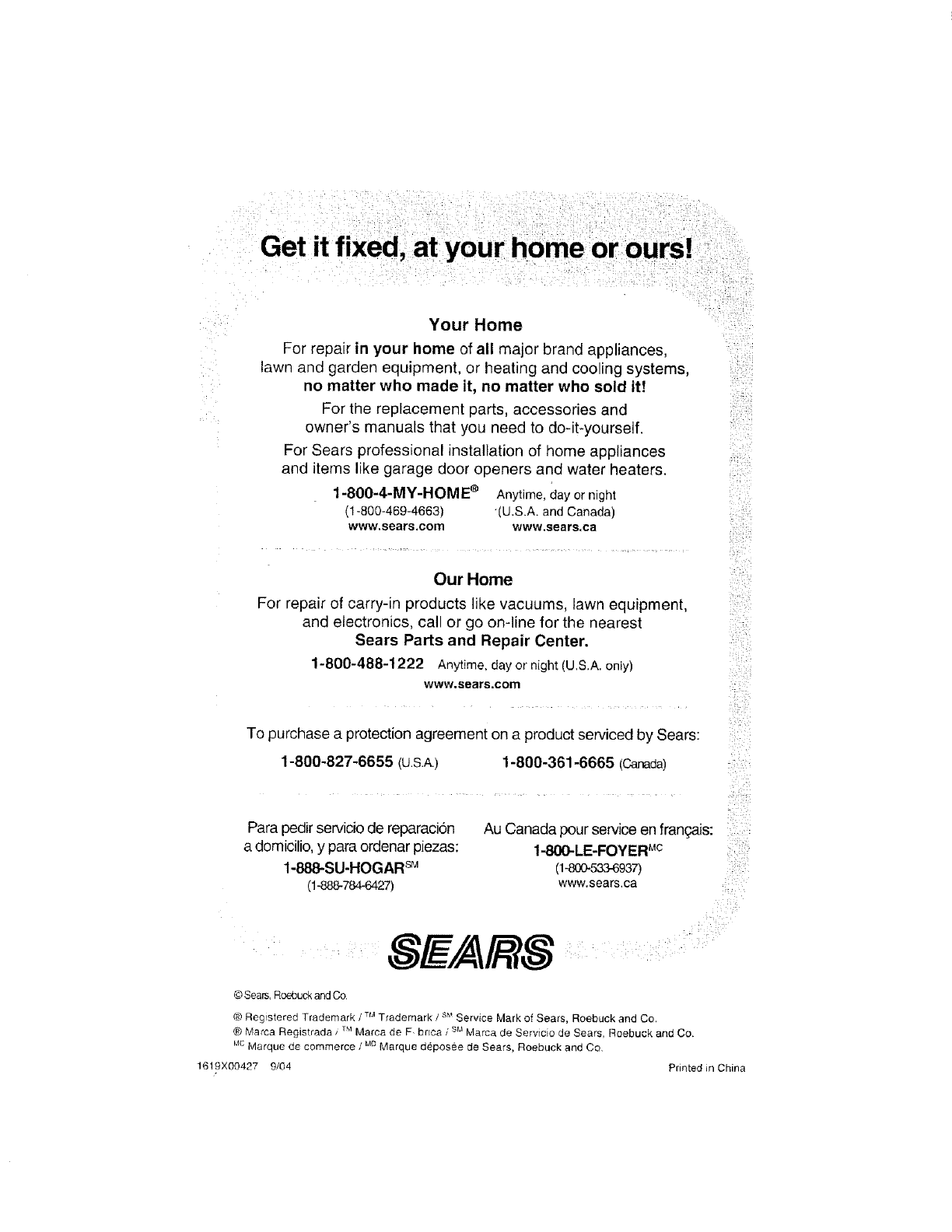
Get it fixed, at your home or ours!
Your Home
For repair in your home of all major brand appliances,
lawn and garden equipment, or heating and cooling systems,
no matter who made it, no matter who sold it!
For the replacement parts, accessories and
owner's manuals that you need to do-it-yourself.
For Sears professional installation of home appliances
and items like garage door openers and water heaters.
1-800-4-MY-HOME e Anytime, day or nght
(1-800-469-4663) (U.S.A. and Canada)
www.sears.com www,sears,ca
Our Home
For repair of carry-in products like vacuums, lawn equipment,
and electronics, ca] or go on-line for the nearest
Sears Parts and Repair Center.
1-800-488-1222 Anybme, day or night (U,S.A. only)
www,sears.com
To purchase a protection agreement on a product serviced by Sears:
1-800-827-6655 _U.S.A.) 1-800-361-6665 (Canada)
Para pedir servicio de reparaci6n
a domicilio, y para ordenar p_ezas:
1-888-SU-HOGAR _1
.1-888-784,-6427_
Au Canada pour service en frangais:
1-800-LE-FOYER Mc
(1-800-533-6937)
www,sears,ca
© Sears, Roebuck and Co,
® Registered Trademark /TlvlTrademark /s_, Service Mark of Sears, Roebuck and Co.
® Marca Registrada /T',_Marca de F, br_ca /s_,_Marca de Servic[e de Sears, Roebuck and Co.
Mc Marque de commerce /ue Marque d_posee de Sears, Roebuck and Co
1619X00427 9/04 Printed in China